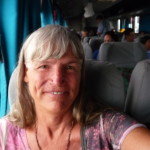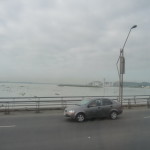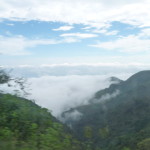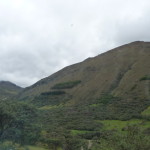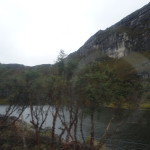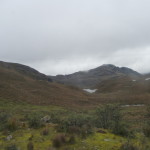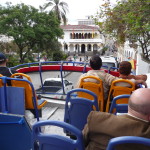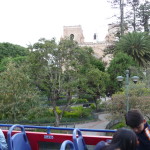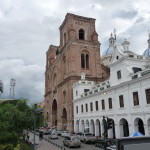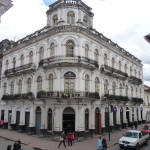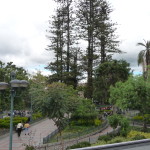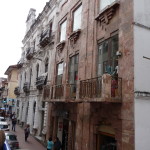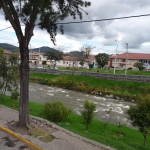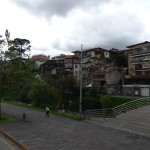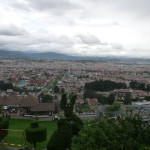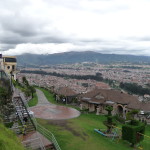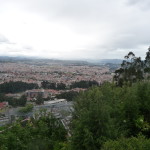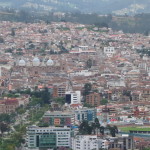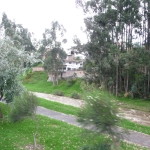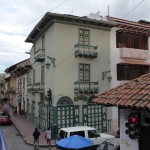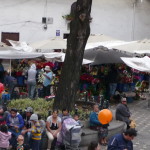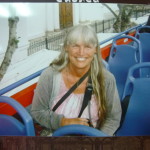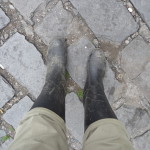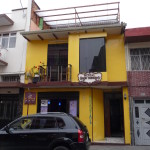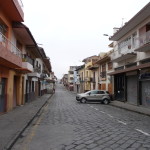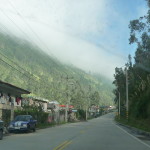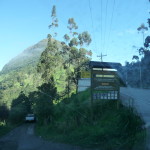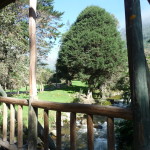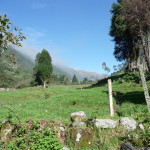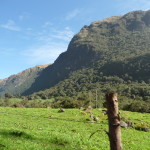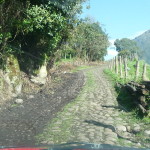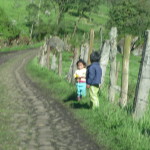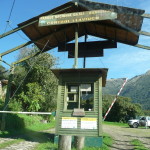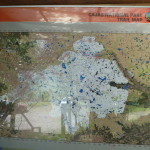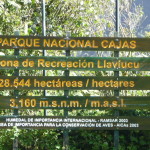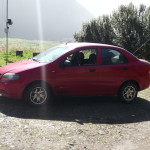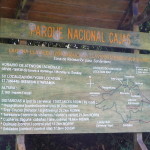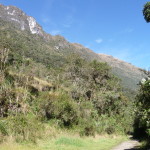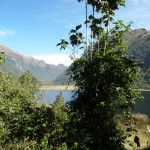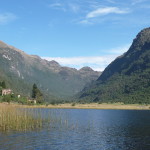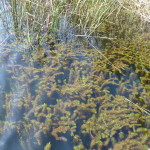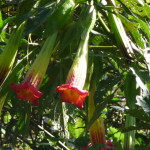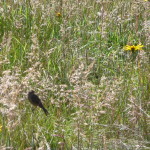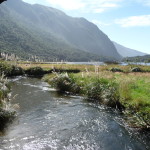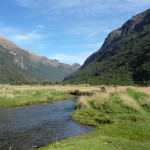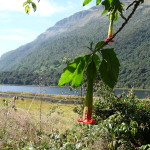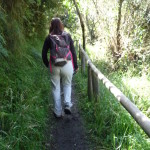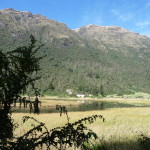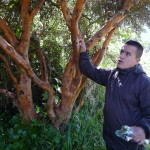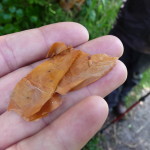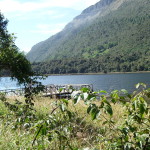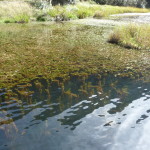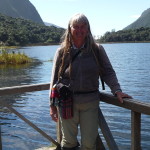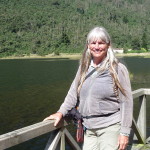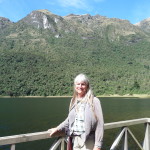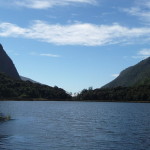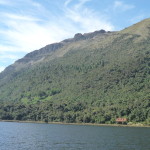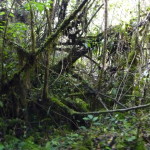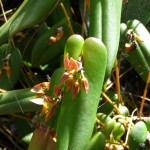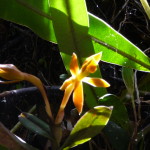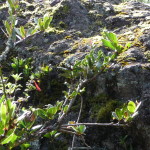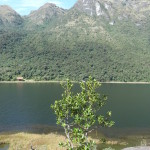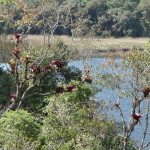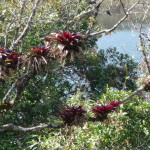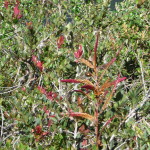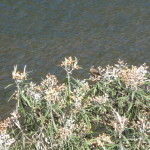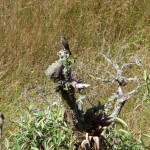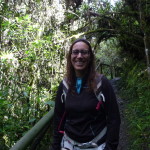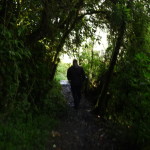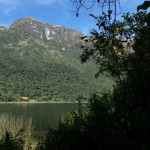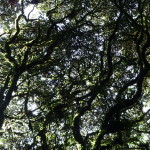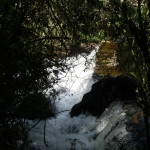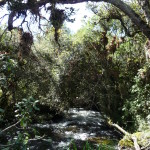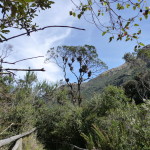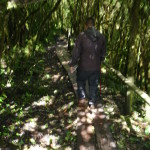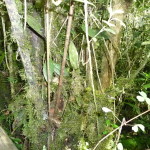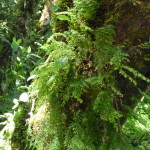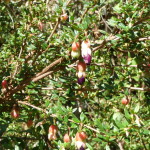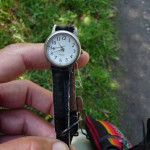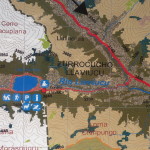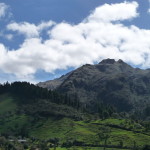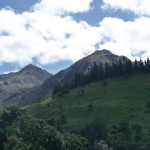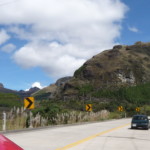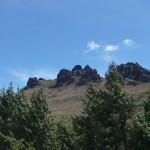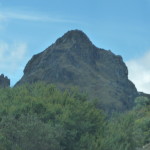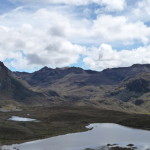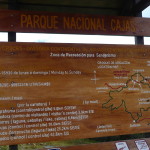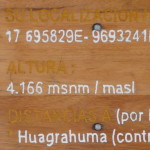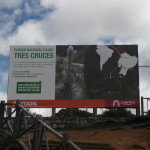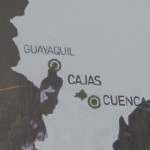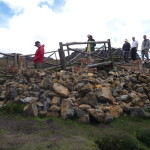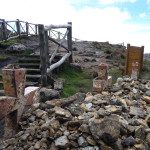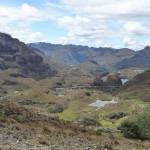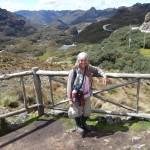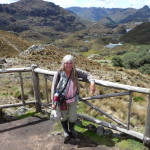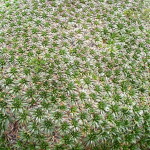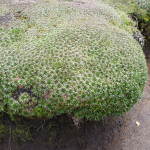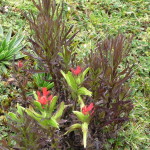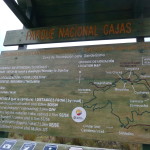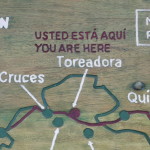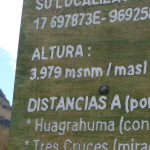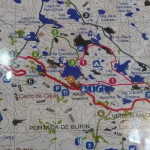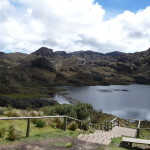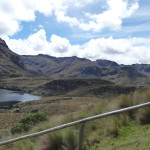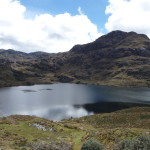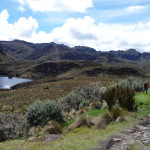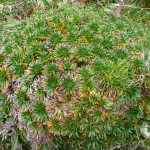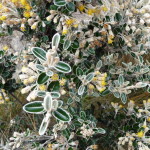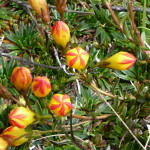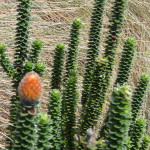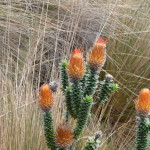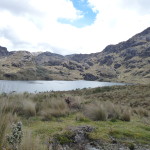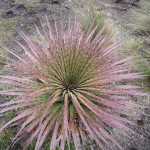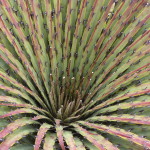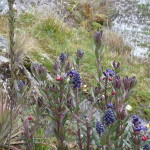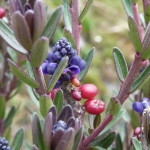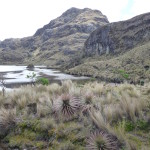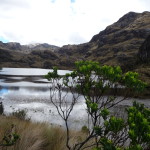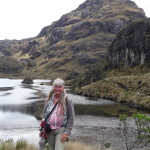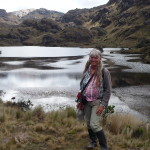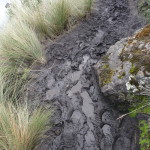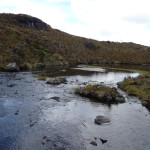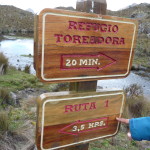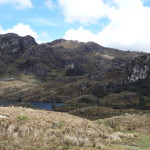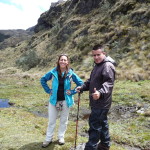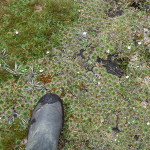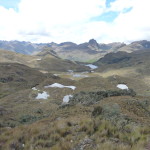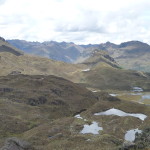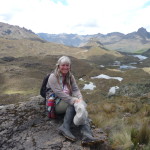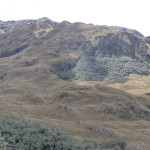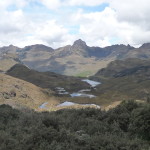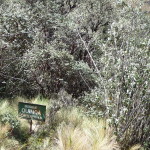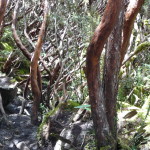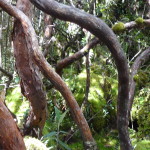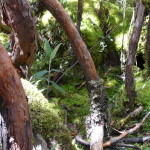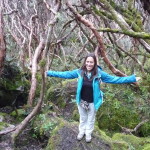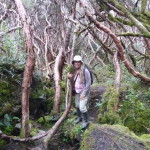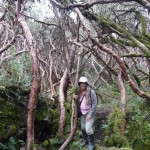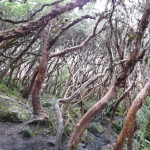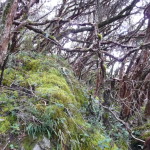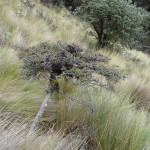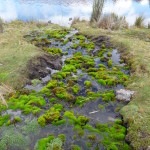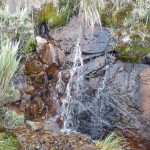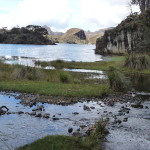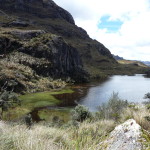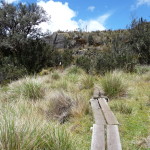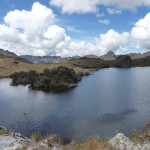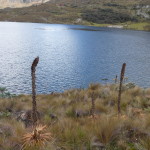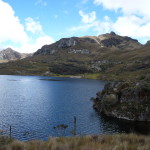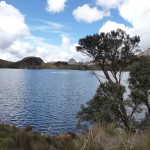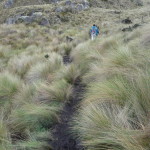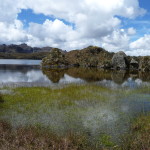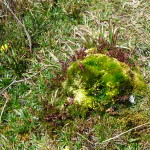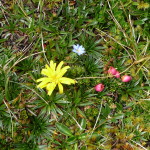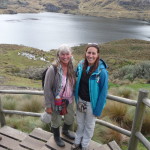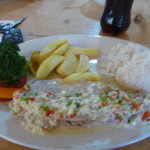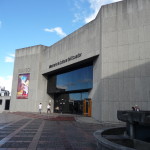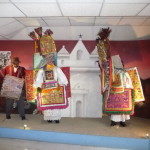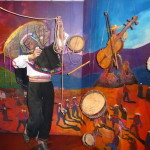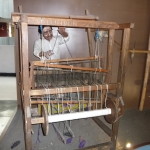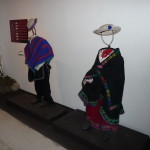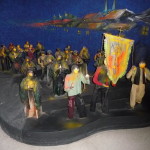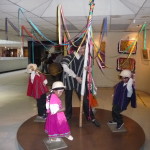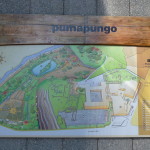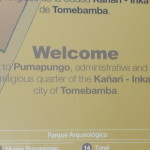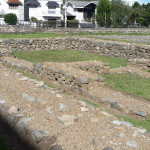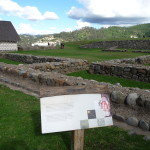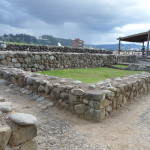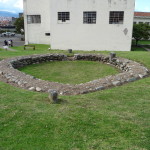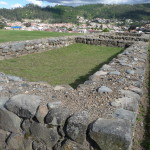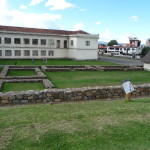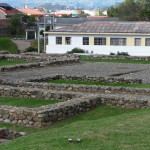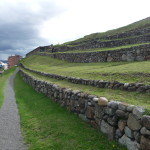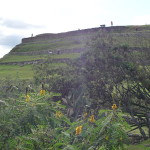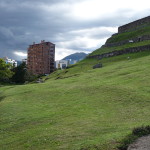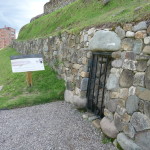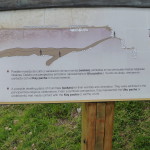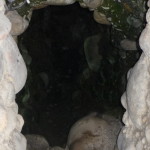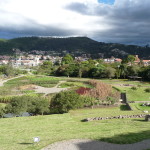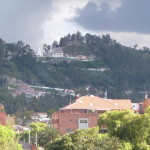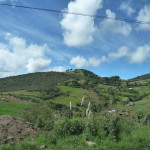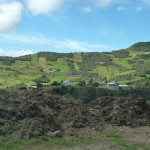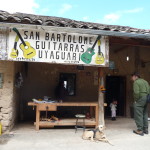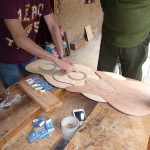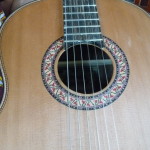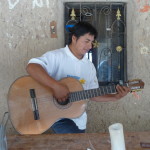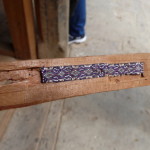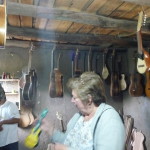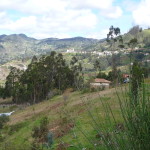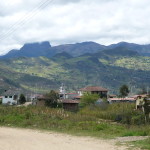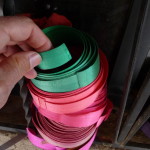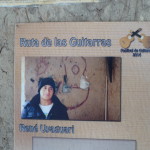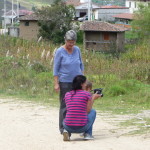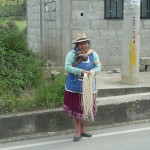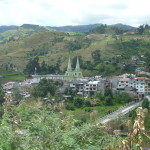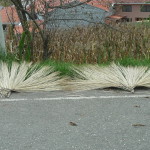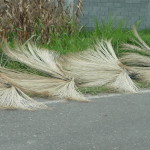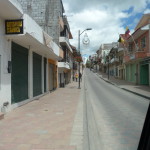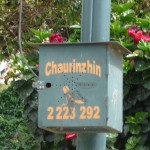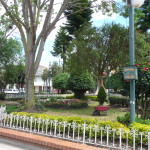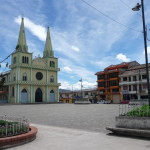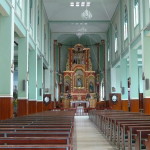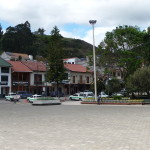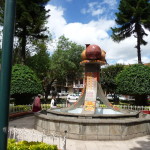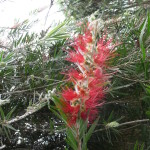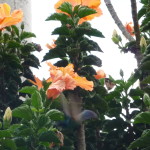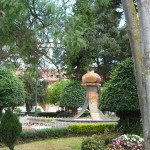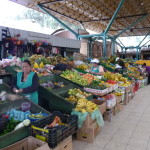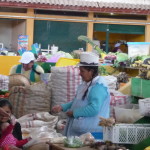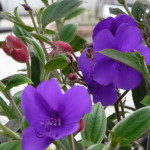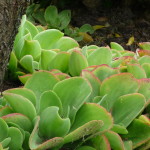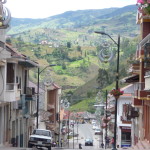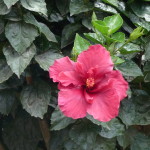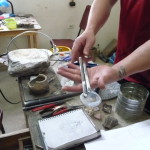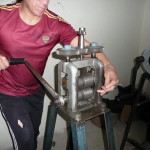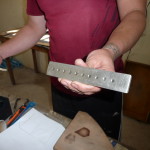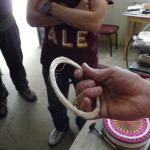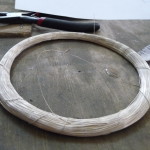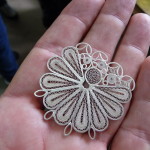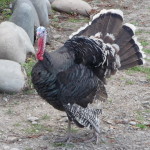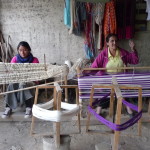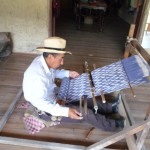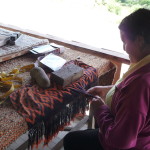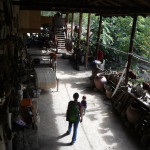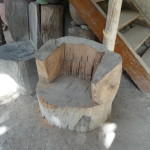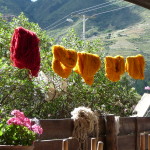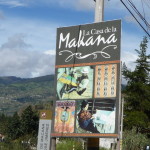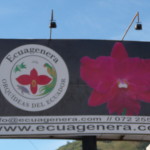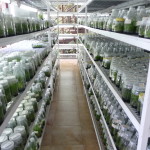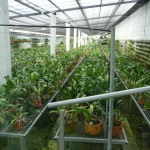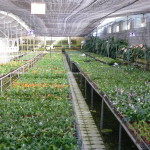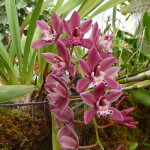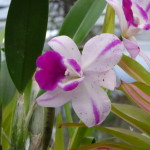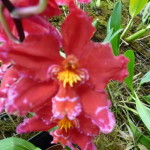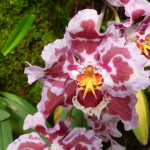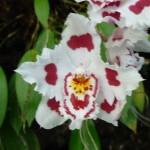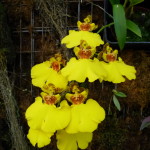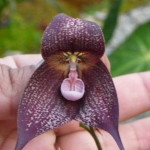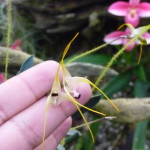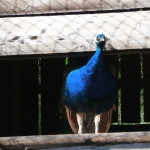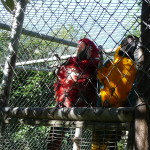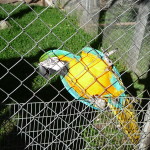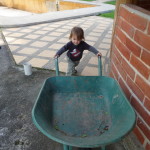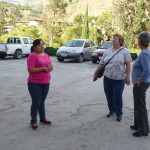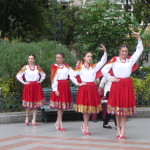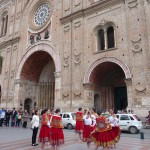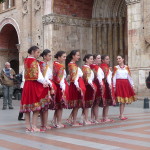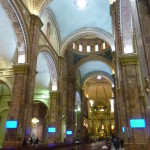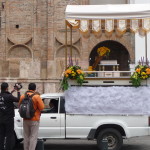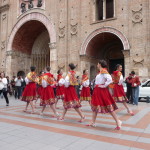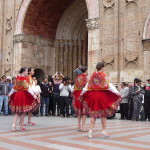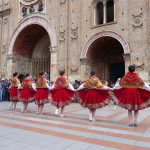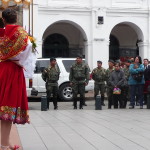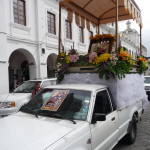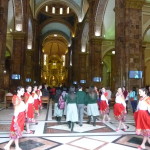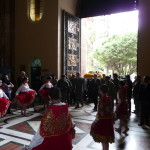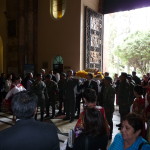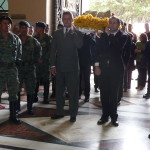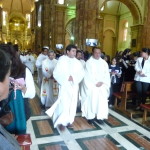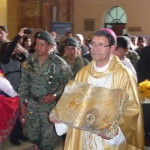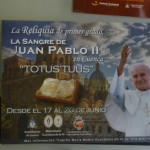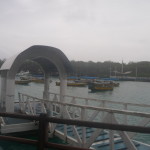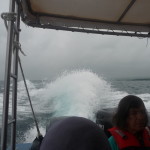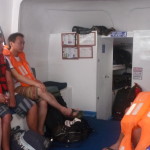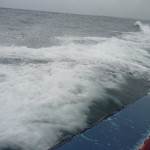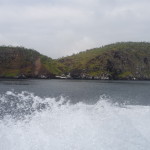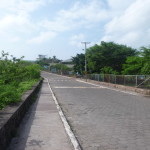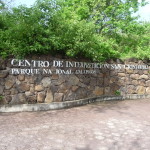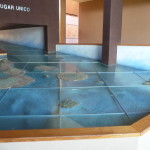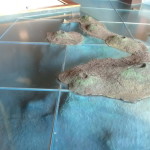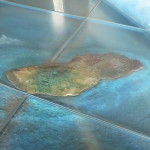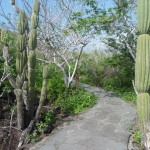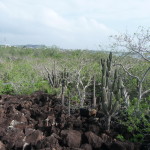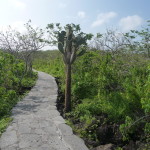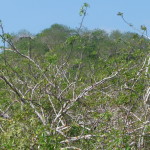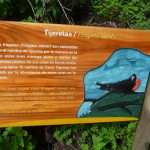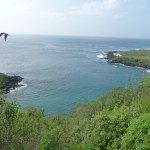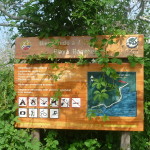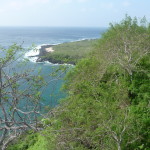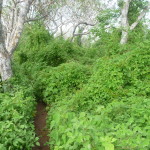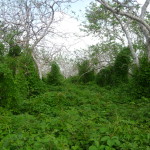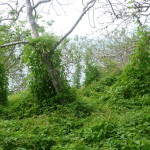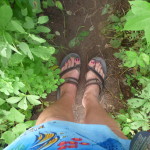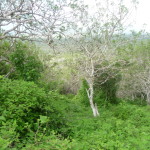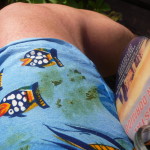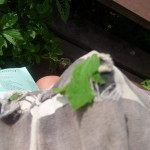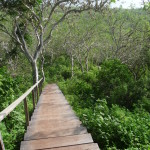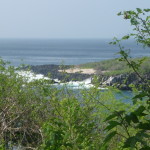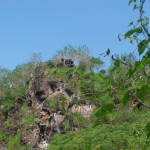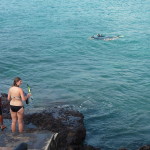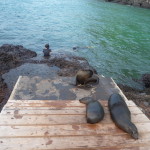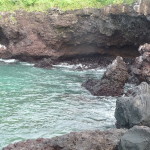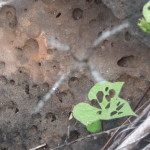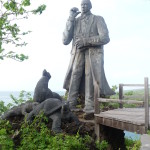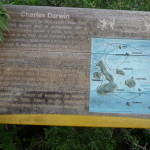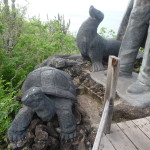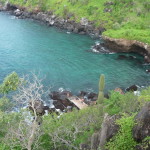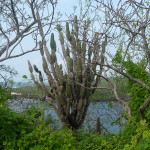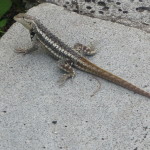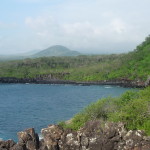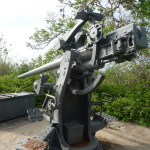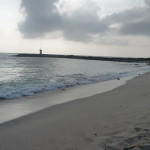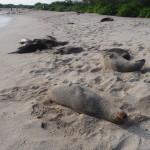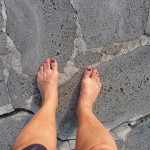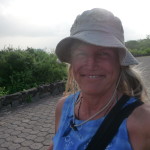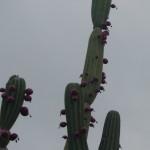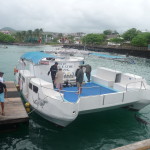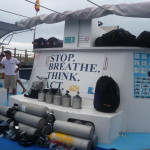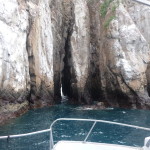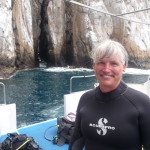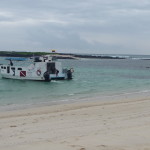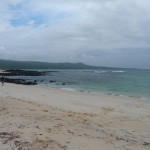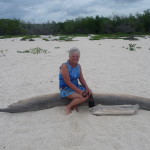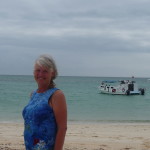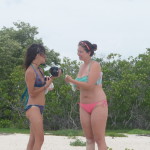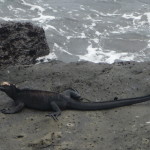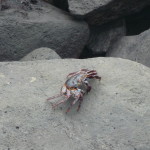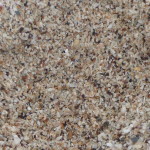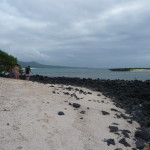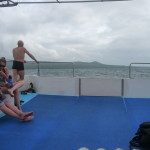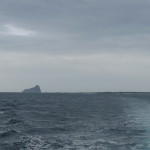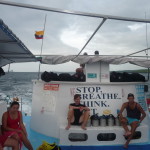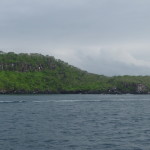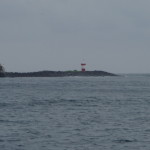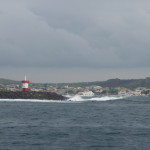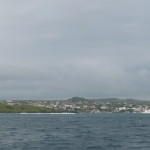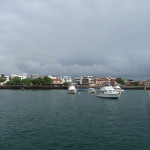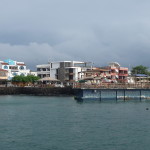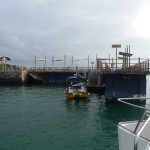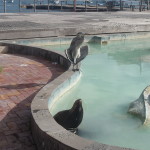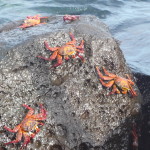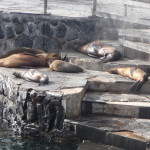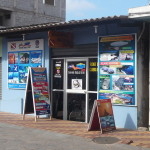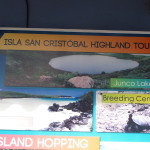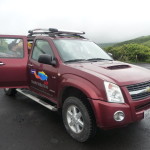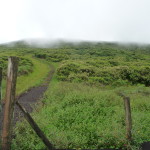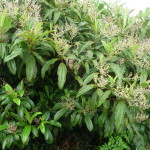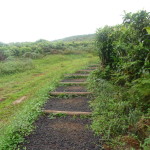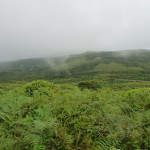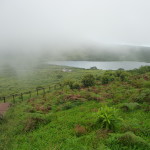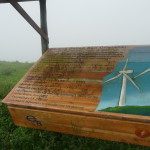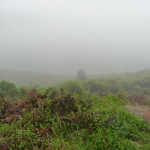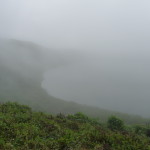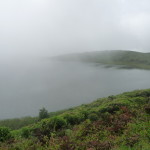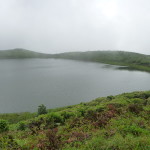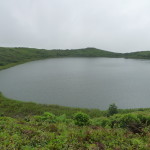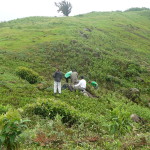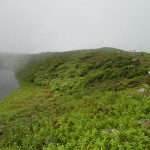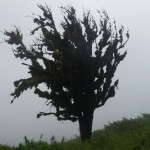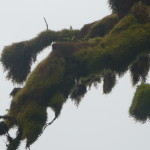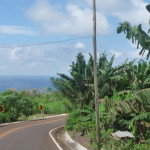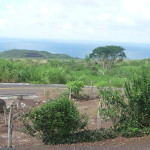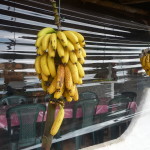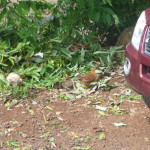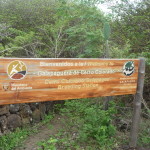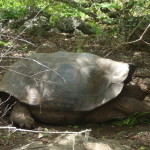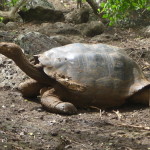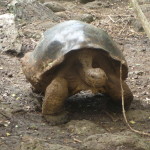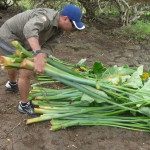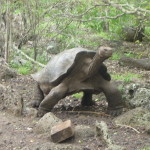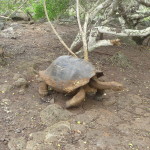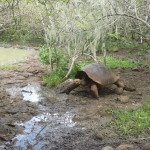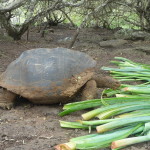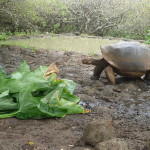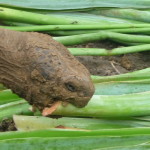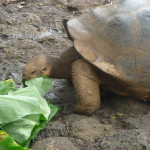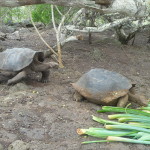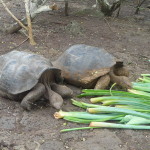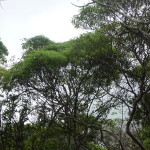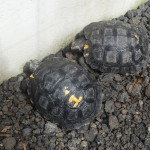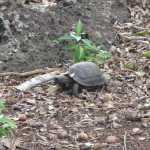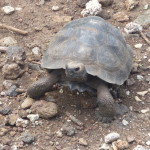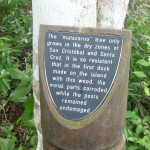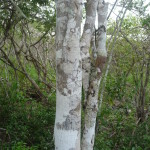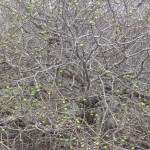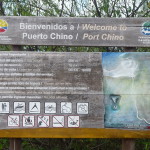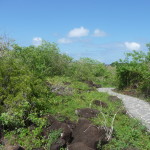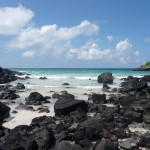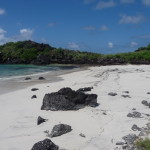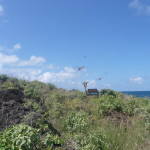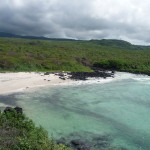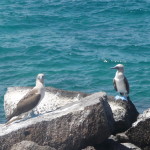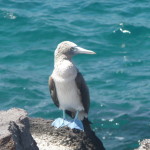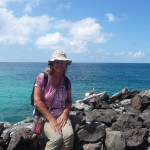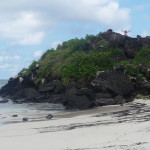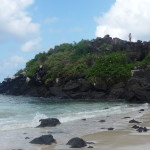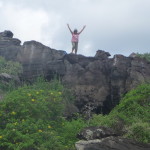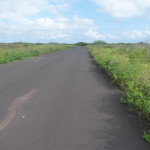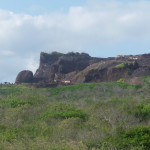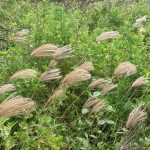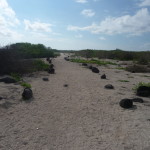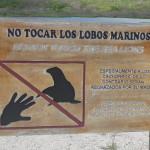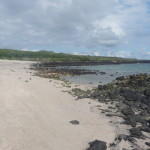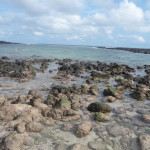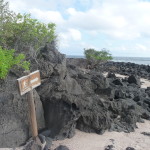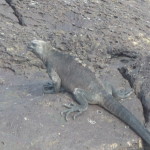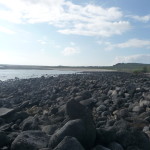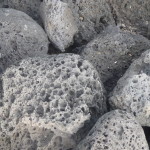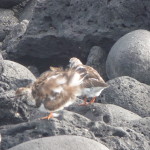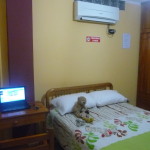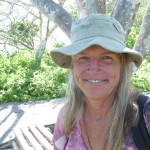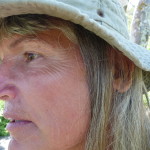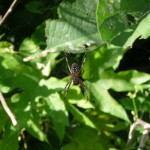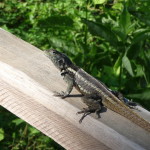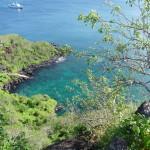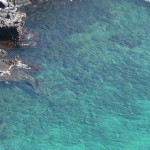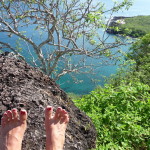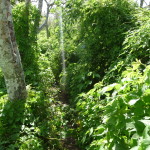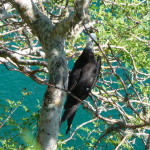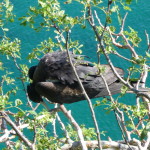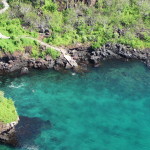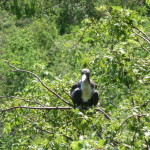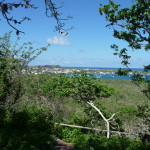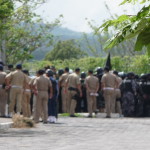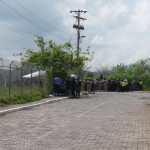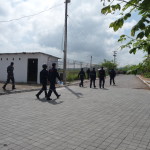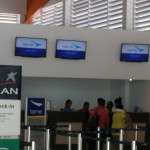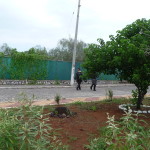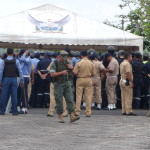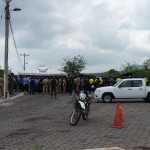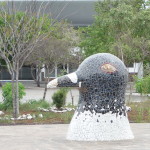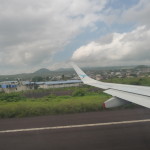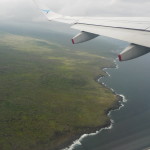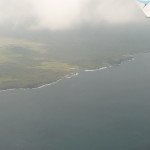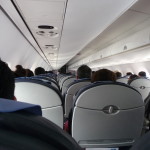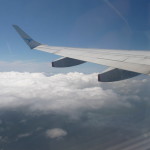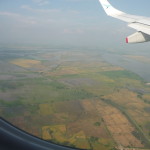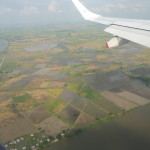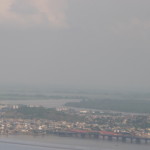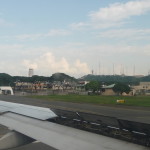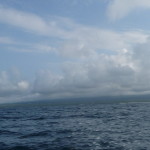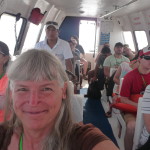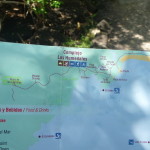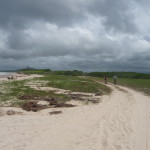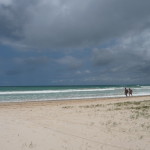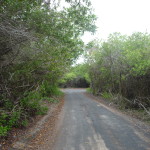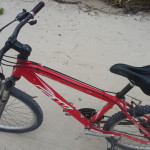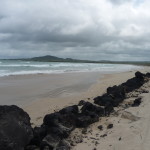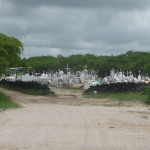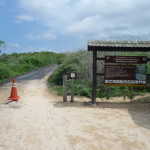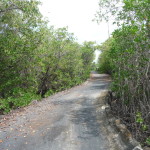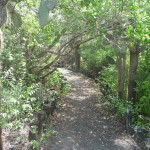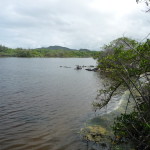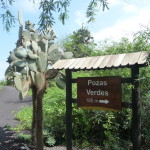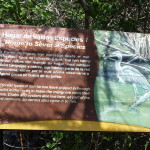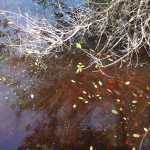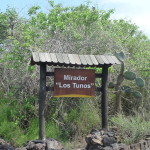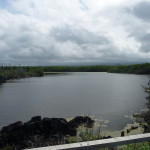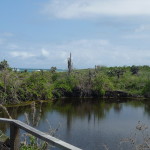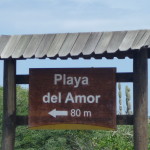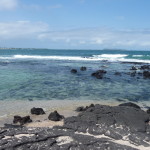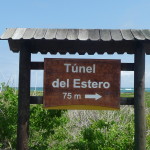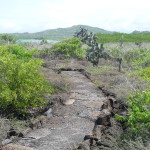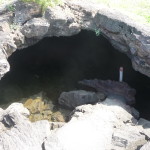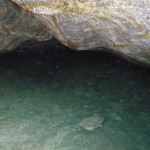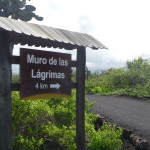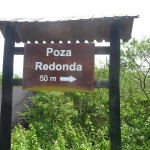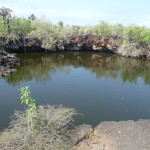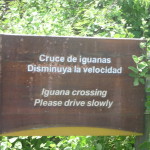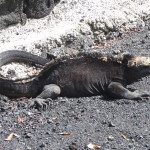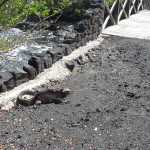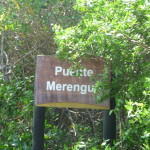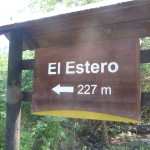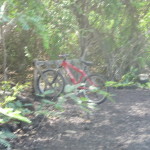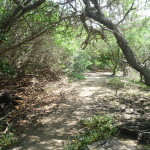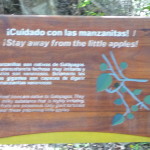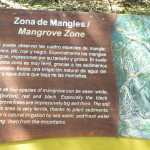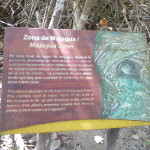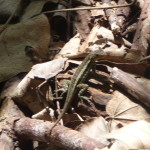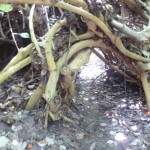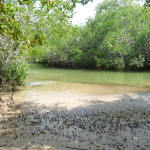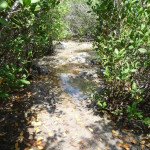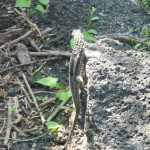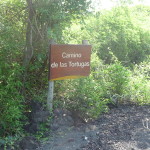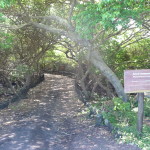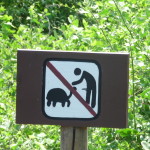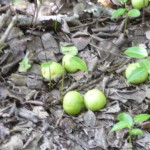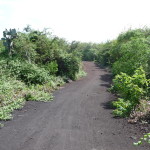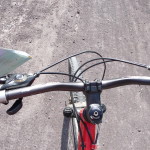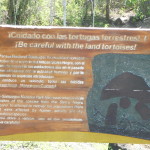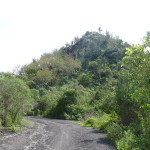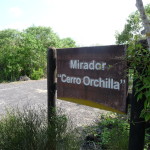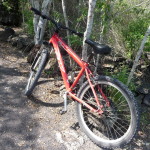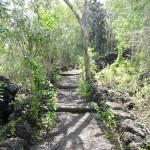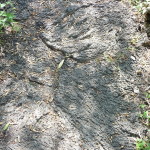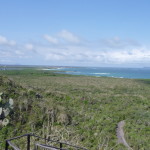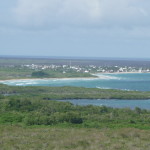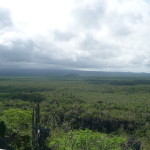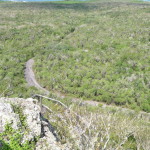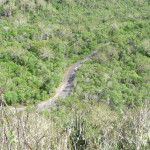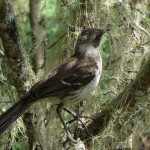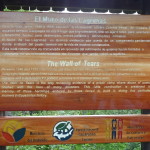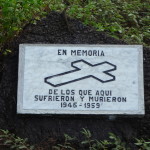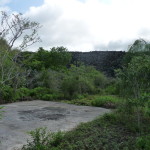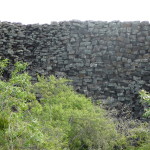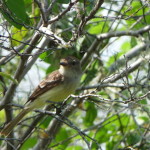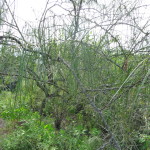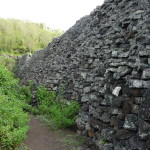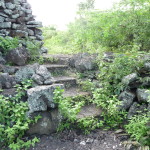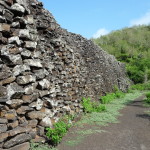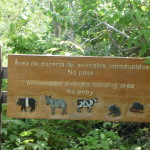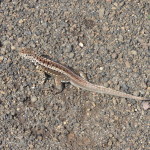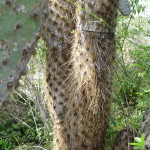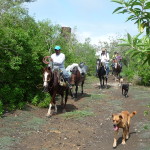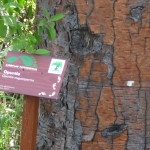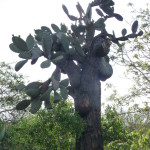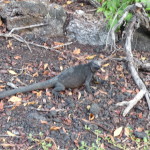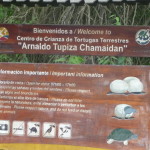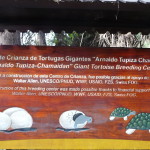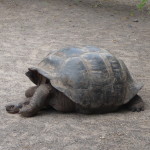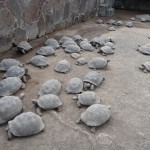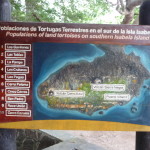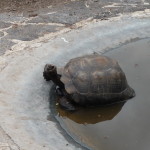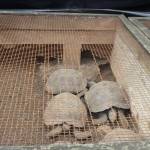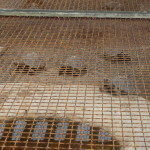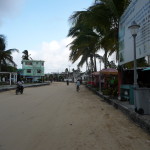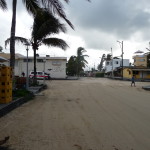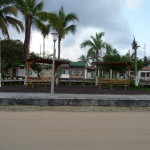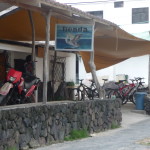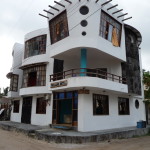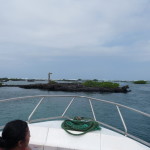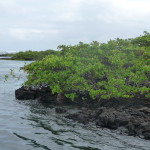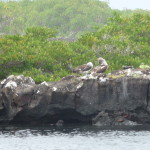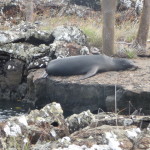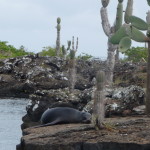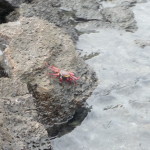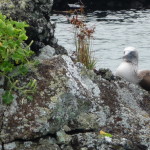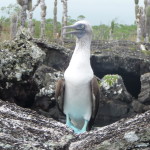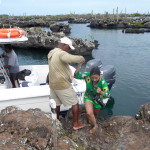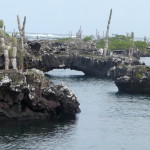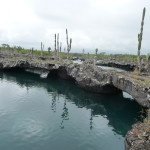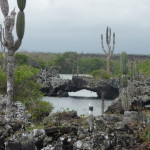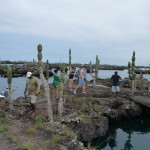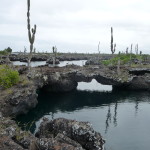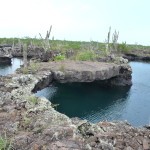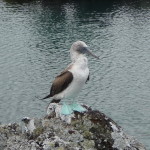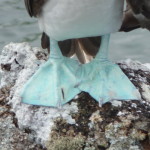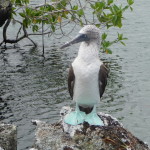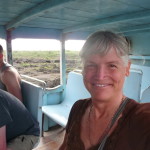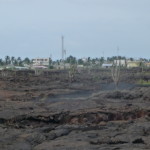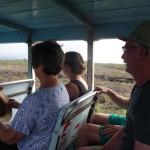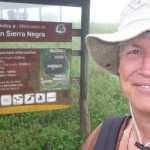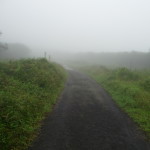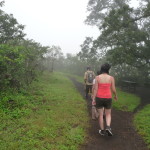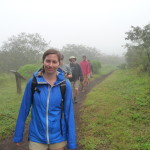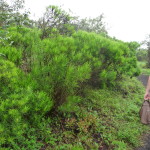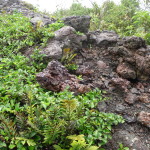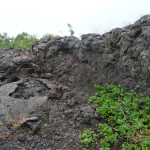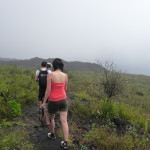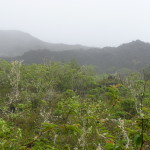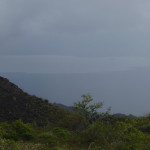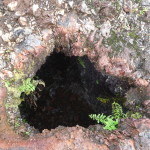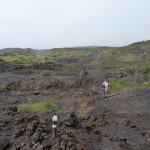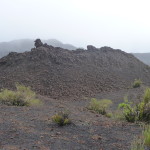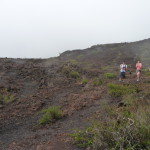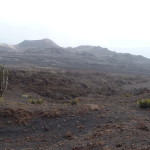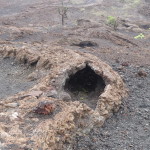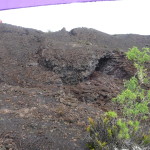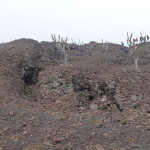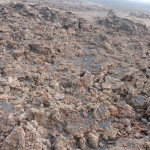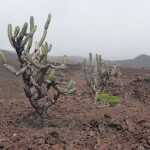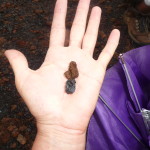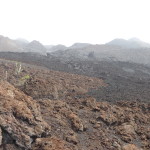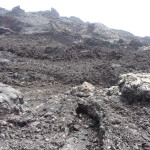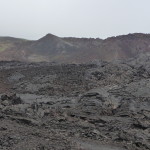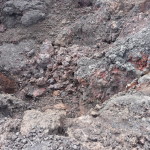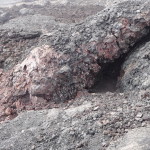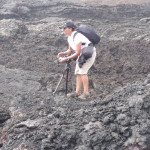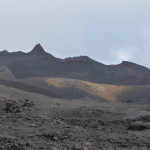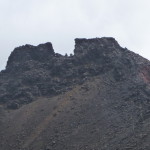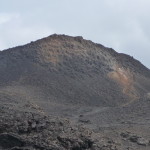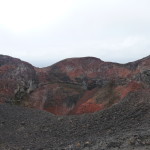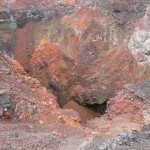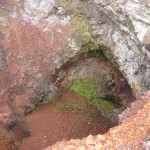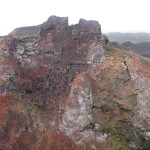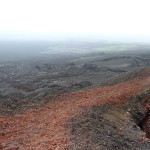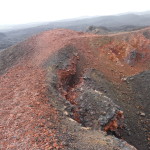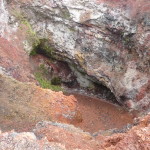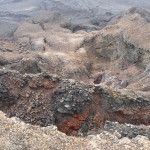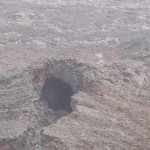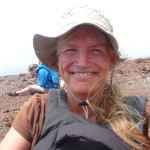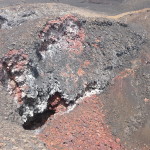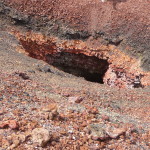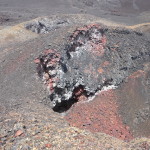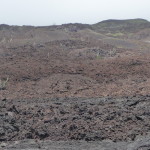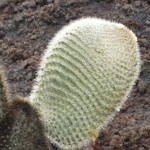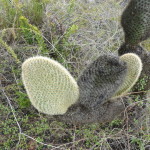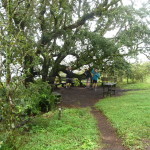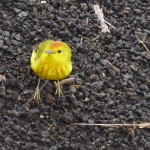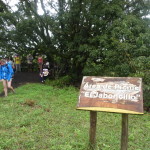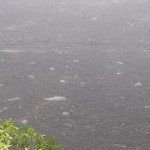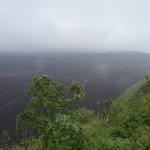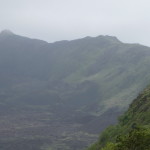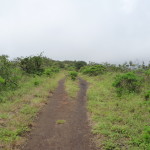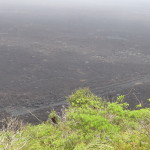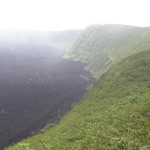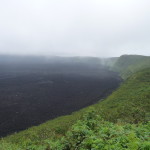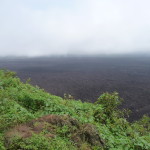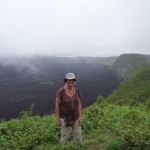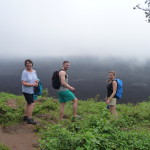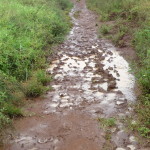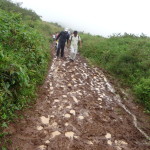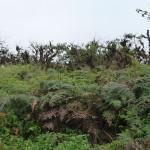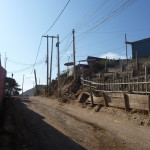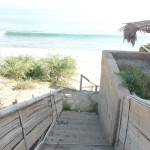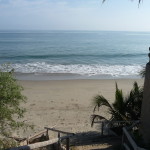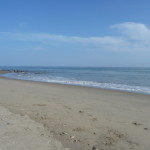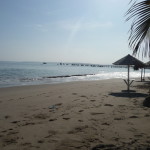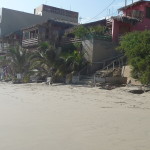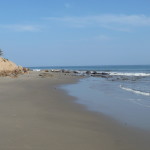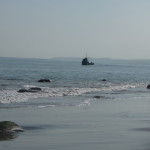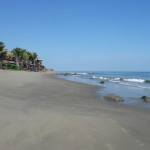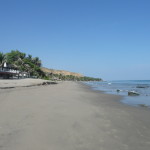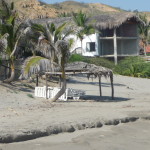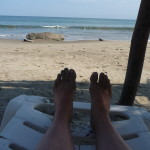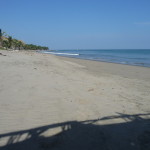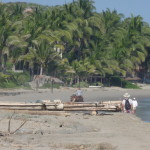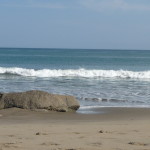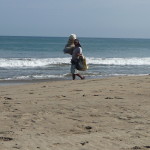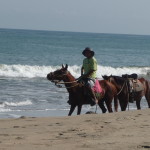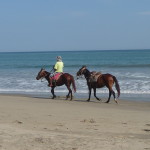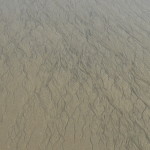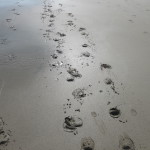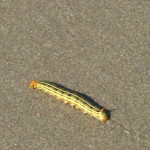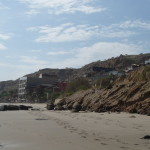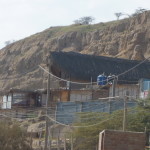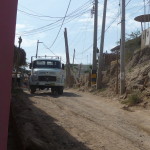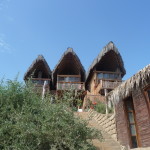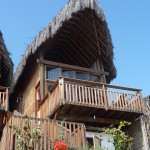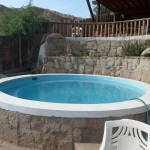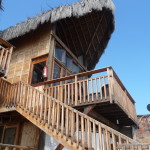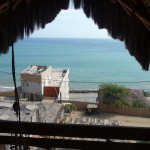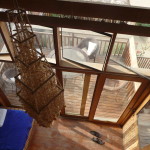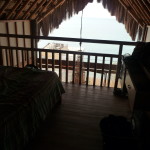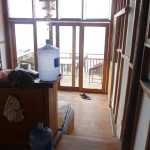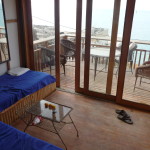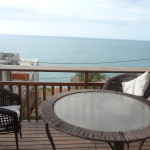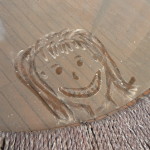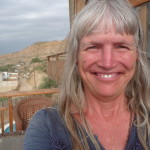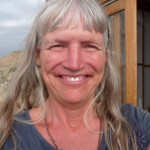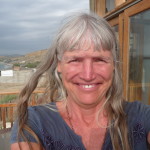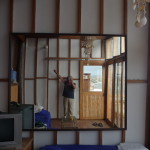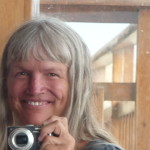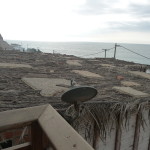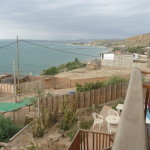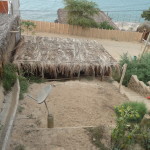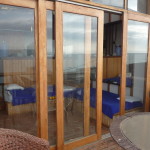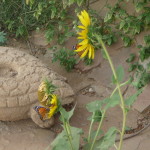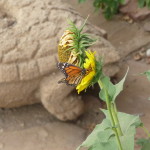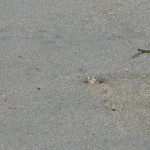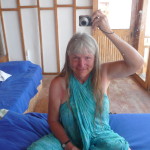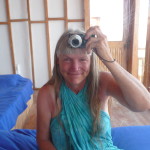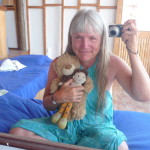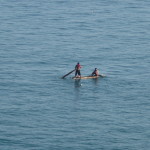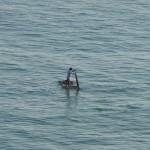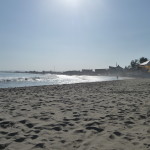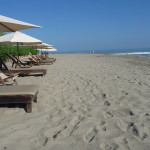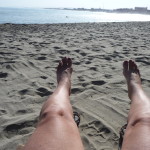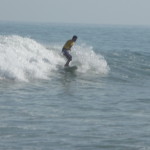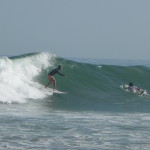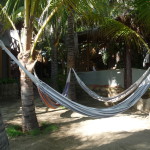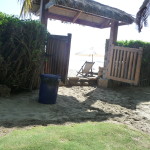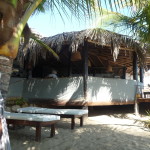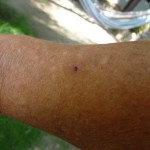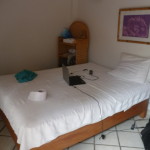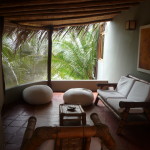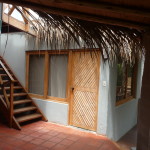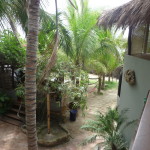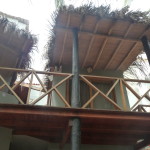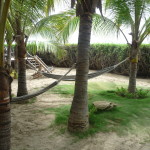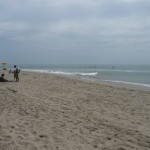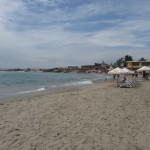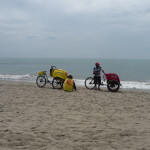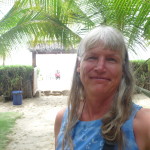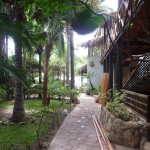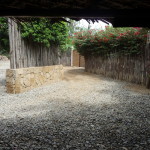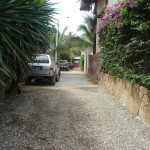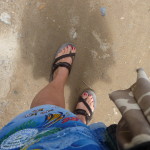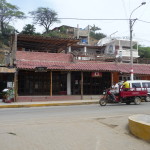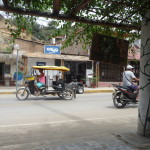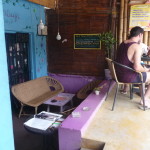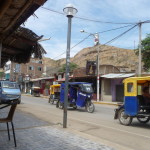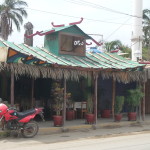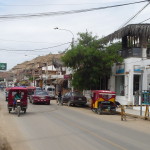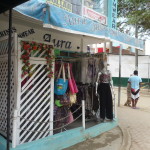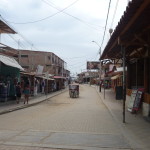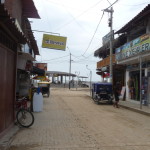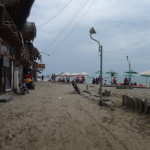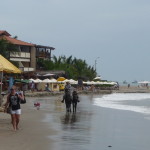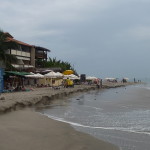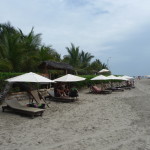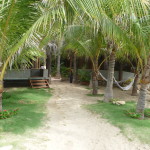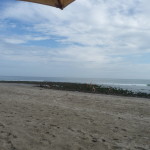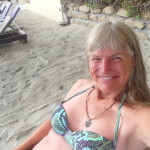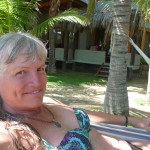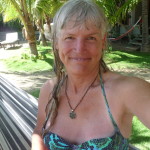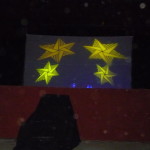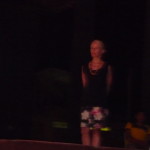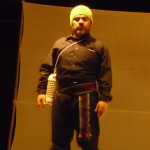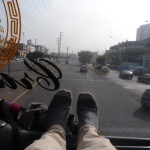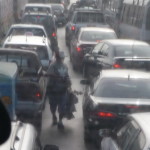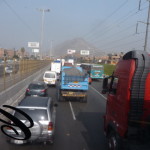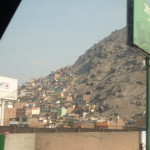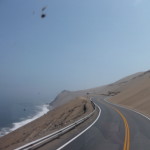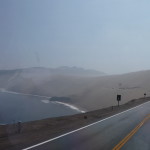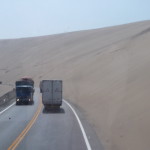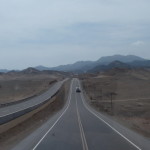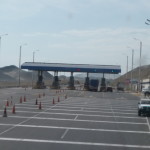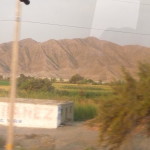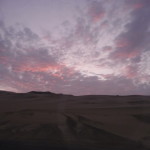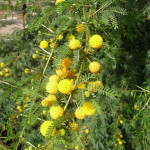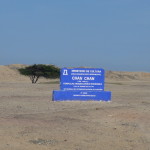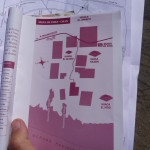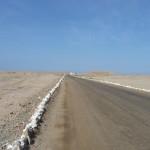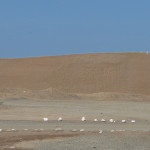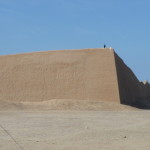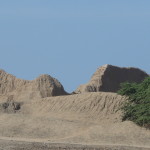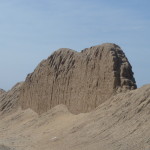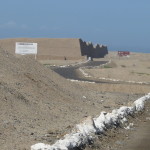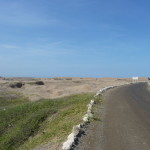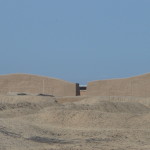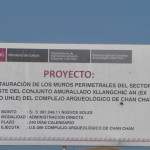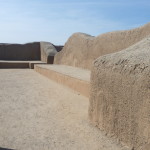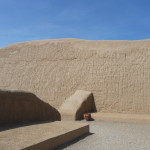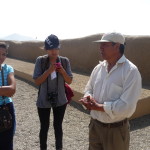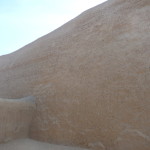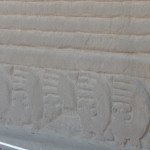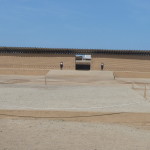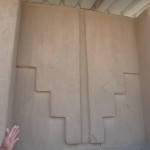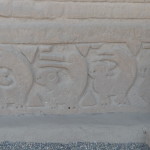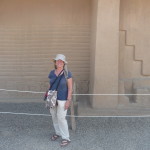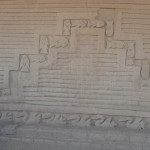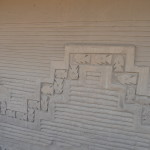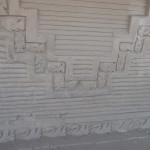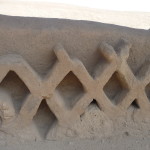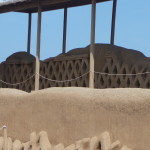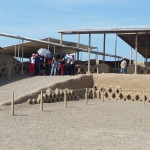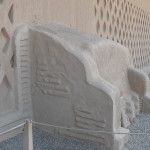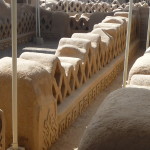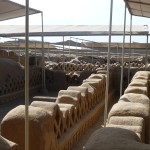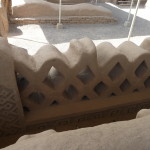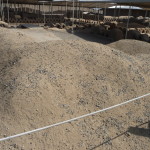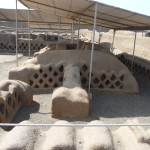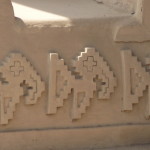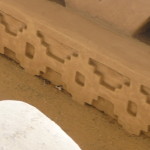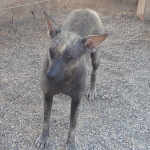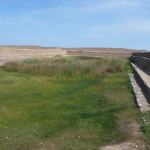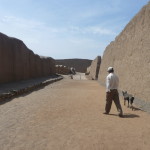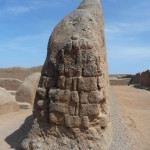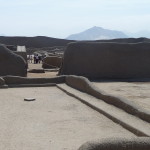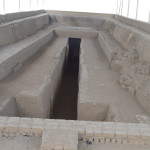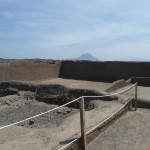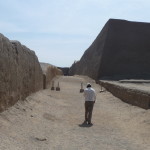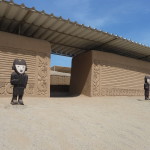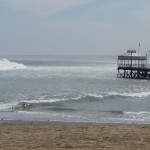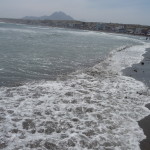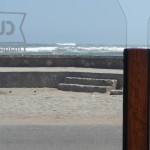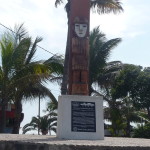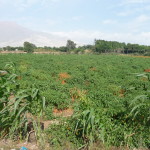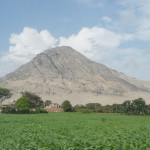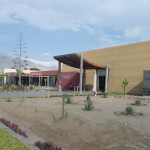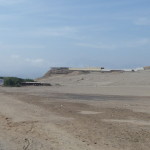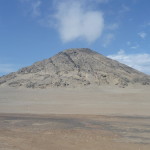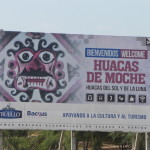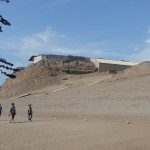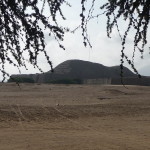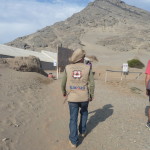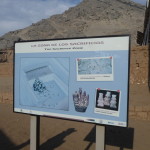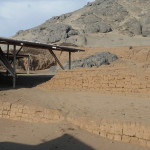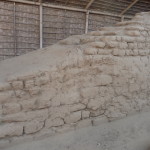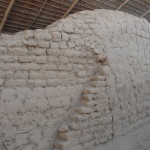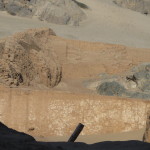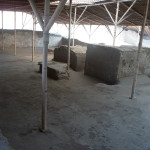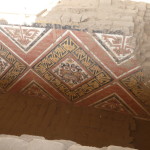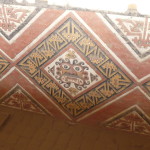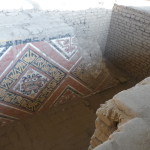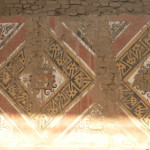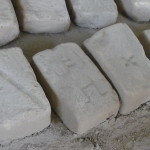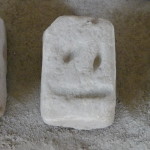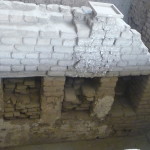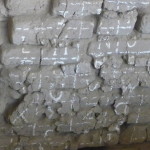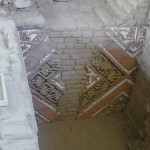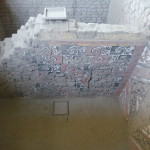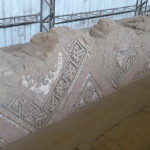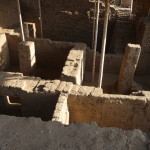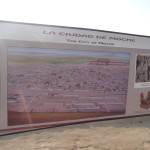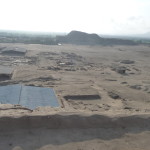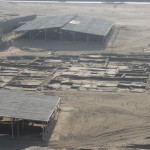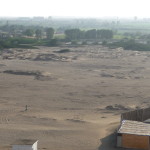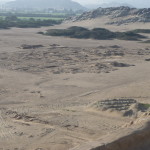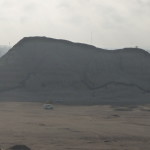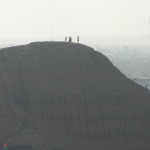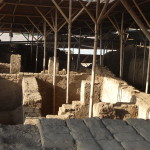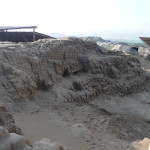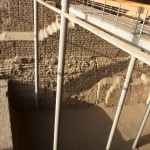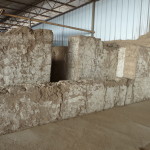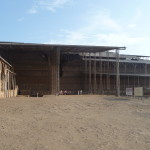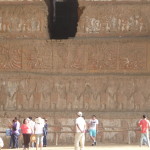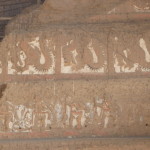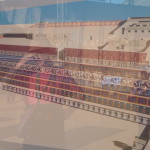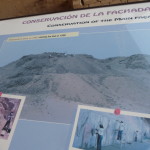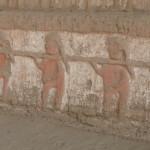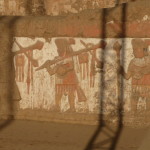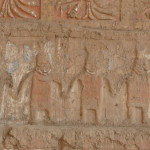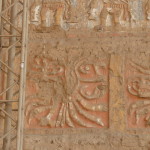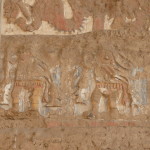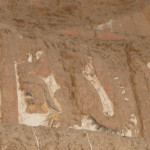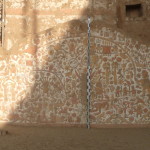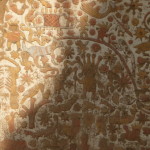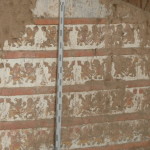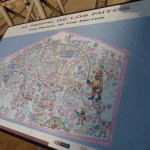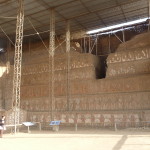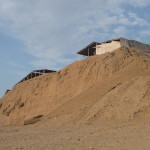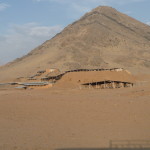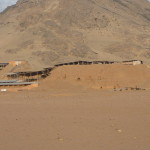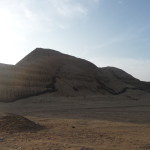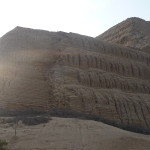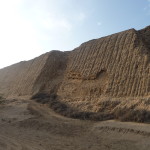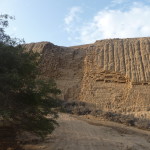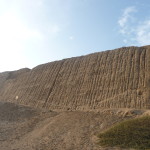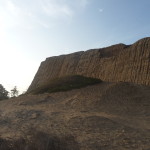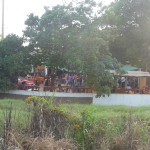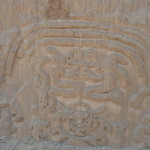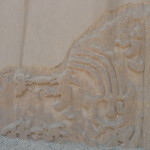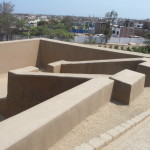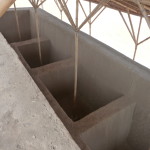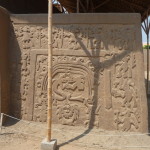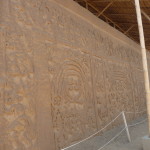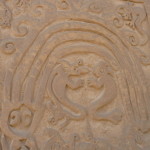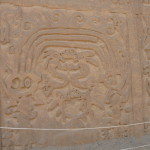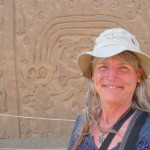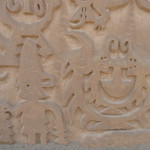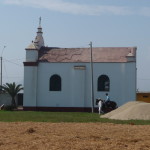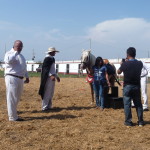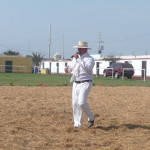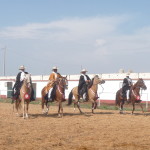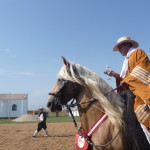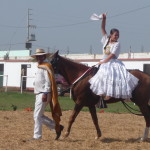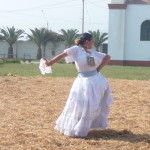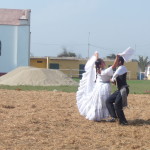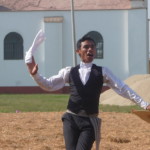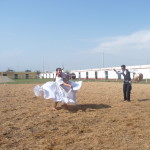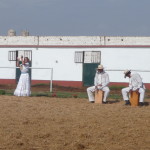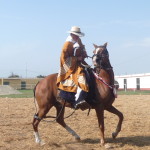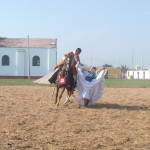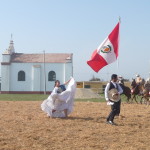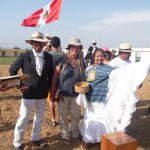On Wednesday morning, May 27, 2015, I left Máncora, Peru, heading north, first on a small public collective minivan and then on a “CIFA International” full size bus. Our first stop on the bus was at the border between Peru and Ecuador. Our final destination was the city of Guayaquil, the second largest city in Ecuador. My intention for Guayaquil was just to get in and out as quickly as possible. The first 15 photos in this post document that short journey.
Early on Thursday morning, May 28, 2015, I headed to the Guayaquil airport, where I boarded a plane with a destination of the Baltra airport – a small airport on tiny Baltra Island right next to Santa Cruz Island. The flight took me more than 600 miles west, out into the huge Pacific Ocean.
This post contains 238 photos that document my journey to the Galapagos, plus all of my time on the islands of Santa Cruz and Floreana. Subsequent posts will cover my time on Isabela and San Cristobal islands.
As usual, the photos in this post are thumbnail images. Please click on any photo to enlarge it. The thumbnails leave much to be desired as far as colors and resolution – plus the thumbnails clip all of the edges. I use thumbnails for the post itself, because it gives people an opportunity to get a summary glimpse without downloading huge amounts of data for the high-res photos.
CLICK ON ANY PHOTO TO ENLARGE TO HIGH RESOLUTION
For the first two hours of my journey, I rode in a collective minivan through the furthest north regions of Peru (along the Pacific coast, that is). Our destination was the border town of Tumbes.
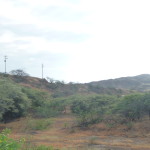
This is a sampling of the scenery along the way .
In Tumbes, the driver dropped me off at the CIFA International bus station where I caught a 10:00 a.m. bus headed north into Ecuador. The border crossing went very smoothly, with both the Peru and Ecuador customs agents being in the same room in brand new facilities.
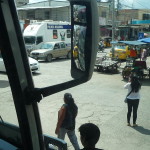
During that first phase of the bus ride, we only had about six passengers on board. I took this photo looking out the window during our first stop on the Ecuador side – at a small town called Huayquillas.
During this stop, the entire bus filled up with passengers headed to our destination of Guayaquil.
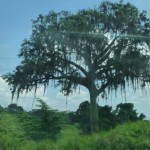
A beautiful tree along the highway. The Ecuador coast was beautiful and lush with green growth. Somewhere between Peru and Ecuador the climate completely shifted.
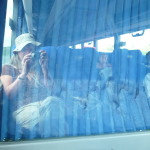
Me, playing around on the bus. I was in the front row, on the left window, looking directly at the back of the driver’s window (separating him from the passengers). The driver had the curtain pulled, causing the window to act like a partially transparent mirror.
That is my reflection on the left.
It was really strange seeing myself and the passengers behind me — yet if I focused just right I could also see the driver and the road in front of me — a fun brain adventure.
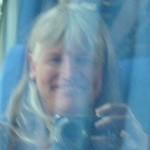
More fun playing with the reflection – showing my huge grin.
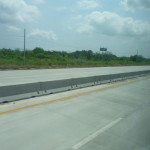
The highway here in this part of Ecuador was a four-lane divided highway, very well maintained. I haven’t seen nice roads like this for a very long time.
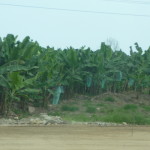
For the entire four-hour journey to Guayaquil, we repeatedly passed by huge fields growing bananas. If you look closely (or click to enlarge) you can see those blueish bags hanging in the tree. Every large clump of bananas is covered by these bags, keeping them safe from bugs and birds.
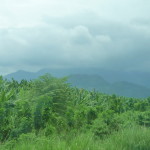
More banana plantations with gorgeous Andes mountains in the background. In this area, the mountains are not very far away from the Pacific coast.
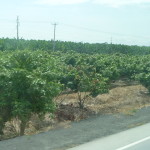
I was quite delighted to look out the window and suddenly realize that we were passing by huge plantations of cacao trees. For those who know me, cacao is a very important part of my life, ever since I studied with Keith, the cacao (chocolate) shaman, in Guatemala. I continue to eat a little bit of pure cacao, almost every day.
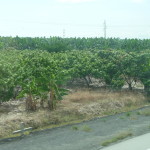
More cacao trees. It is difficult to see in these hastily snapped photos – poorly focused while zooming down the road, looking through dirty windows – but the cacao fruit (pod) actually hangs off of the trunk and thicker branches of the tree. These trees appear to have many such pods.
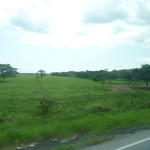
In between the frequent banana and cacao plantations, there were occasional fields like this – huge, gorgeous, grassy areas, with scattered trees here and there.
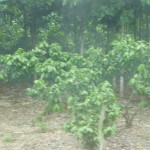
An attempt to get a closeup of a cacao tree – poorly focused. You can barely see a brown pod in the lower center of the photo, about 1/3 of the way up.
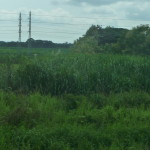
And then we passed the occasional HUGE sugar cane plantations.
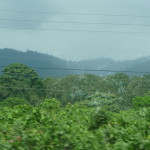
Looking a cacao trees in the foreground and the Andes mountains in the background.
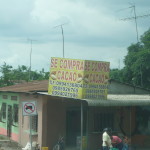
As we passed through a small town, I giggled when I saw this sign that reads, “We buy cacao”.
At around 2:30 or 3:00 p.m., we pulled into a huge and modern bus station (terminal terrestre) in Guayaquil. After gathering my luggage, I found a taxi to take me to a budget hotel in the older part of town (close to the famous Malecon of Guayaquil). I had researched the names of several economical hostels, but had not made any reservations. I randomly choose a name and asked the driver to take me there.
By 4:00 p.m., I was checked in at the Hostal California. It was kind of a dive, but served my purposes – a bed, internet, and air conditioning. It is extremely hot and humid there.
I quickly went out on a quest, and just before 5:00 p.m., I purchased airline tickets at a small travel agency. The next morning, May 28, 2015, I would be flying to the Galapagos Islands. I had done no advance research of any kind, and just randomly decided to buy tickets for a ten-day stay on the islands.
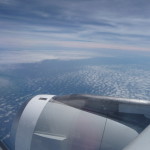
Looking out the window of my plane, on May 28, 2015, as we fly west, over the vast Pacific Ocean. Our destination of Baltra Airport is more than 600 miles to the west.
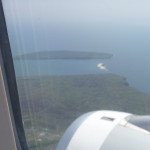
We did an interesting loop. In this photo, we are flying over the Baltra area, but we are still quite high. We end up banking to the right and doing a huge loop over the ocean before returning to land.
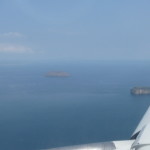
As we took that loop, I was fascinated by these two smaller islands – large rocks sticking up out of the ocean.
At the time, I had no idea that I would be scuba diving right up next to one of them, on the very next day (Daphne Island).
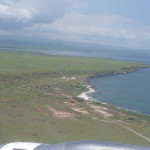
Coming in lower, preparing to land.
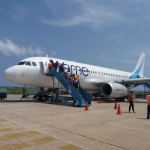
Like many small airports in this part of the world, we got off of the plane by descending down a moveable staircase.
This is my plane from “Tame” airlines. Flying here is not cheap, but this was the least expensive option. Only two other airlines come here – LAN and Avianca.
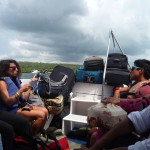
After being herded into a very crowded airport bus, we were taken on a ten minute ride to a nearby boat dock. From there, we took turns climbing into small boats that would take us on another ten minute ride across a small channel to the Island of Santa Cruz.
This is my boat. My luggage is somewhere up there in front.
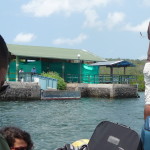
Approaching the dock on the Santa Cruz Island side. The shuttle from the airport was free, and this boat ride cost us $1.00.
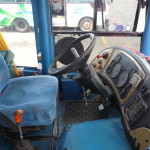
Five minutes later, I stashed my lugged below and climbed up into this old bus. Our destination (the town of Puerto Ayora) is nearly an hour away, on the other side of Santa Cruz Island.
After waiting in this hot bus for nearly a half hour, I was anxious to get on our way. I took the bus because it was just $2.00. A taxi would have cost about $18.00.
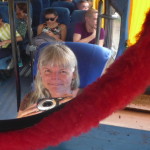
Me, having more fun playing with my camera and the rear-view mirror of the bus.
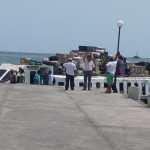
Watching another boat piled with luggage and passengers as it arrives to unload. When the people from this boat climbed aboard the bus, we finally had enough passengers to begin our journey.
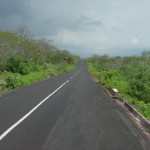
One of the first things I noticed was how green the region was – yet almost all of the area on both sides of the road was filled with dark reddish-brown lava rock.
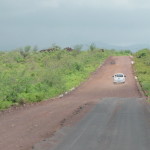
The road alternated from really nice (previous photo) to very rough). In this photo we are entering a rough stage.
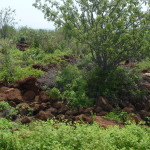
Some of that lava rock, with so much greenery growing out of it.
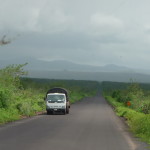
As we crested a small hill, I was surprised to see large hills in the distance … hills covered in clouds. I soon learned that these islands have many different climates. The hills in Santa Cruz are just under 3000 feet ( about 900 meters) – but are usually cloudy and quite wet.
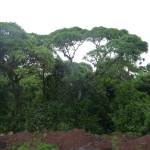
Some of the gorgeous trees as we passed over the hills – doing so in a small rainstorm.
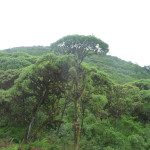
It is quite magical up here.
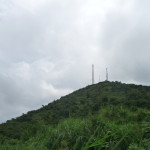
As we approach Puerto Ayora, I see signs of civilization. The Galapagos islands have a population of just over 25,000 inhabitants. The island of Santa Cruz is home to about 12,000 of those people, with most of those living in the area of Puerto Ayora and a couple of surrounding villages.
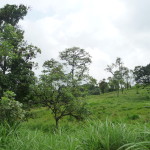
Scenery as we approach Puerto Ayora.
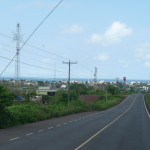
Puerto Ayora is now coming into view in the distance. You can see the ocean right behind it.
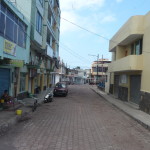
A typical street in Puerto Ayora.
Scuba Diving at Daphne and Seymore
After checking in at the “Hospedaje Brattle” (just one I found – having had no reservations), I began to explore the area. One of the first things I did (after going to an ATM) was to reserve a scuba diving trip for the very next morning (May 29, 2015).
I spent the remainder of the day getting fed at a restaurant, trying on my scuba gear, and people-watching near the main boat dock.
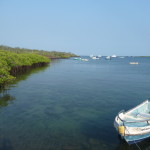
Early on Friday, May 29, 2015, I met up with my group at the dive shop. Soon we were put in taxis that took us all the way across the island, back to the side near the airport.
This photo was taken while waiting for the rest of our group to arrive The water here is gorgeous, and the little bay is enclosed with Mangrove trees and lots of wildlife.
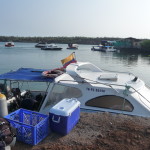
Looking down at our dive boat. It is quite small, especially considering that there were about nine divers plus two dive-masters, plus about three crew members.
The back is filled with tanks and scuba gear.
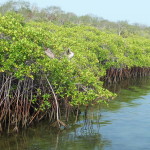
Closeup of the mangroves and large birds.
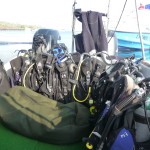
Closeup of some of our scuba gear.
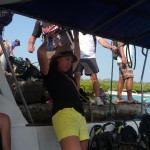
Finally, after standing around for what felt like a half-hour or more, we climb down into the boat.
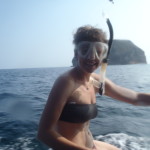
OLYMPUS DIGITAL CAMERA
About forty-five minutes later, as we approached “Daphne” (large rock in background), our crew spotted a huge group of dolphins off in the distance. Hundreds of them were jumping, splashing, and swimming. We took off to rendezvous with them.
We giggled with our dive masters told us to get our snorkel gear on and to jump in. This is one of my boat-mates – a very fun woman from Canada, now living in Britain.
All of these next photos were taken by my dive master, who then shared them with us after the trip.
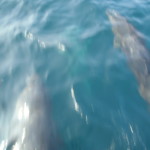
OLYMPUS DIGITAL CAMERA
Looking at a couple of dolphins playing below us in the water, directly in front of the boat.
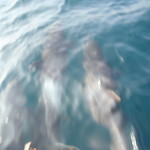
OLYMPUS DIGITAL CAMERA
And three more of them…
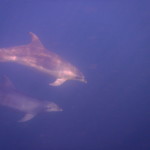
OLYMPUS DIGITAL CAMERA
Some of the dolphins as we snorkeled around.
The dive master took some great photos. I was struggling to keep up with the dolphins. They didn’t come closer than about ten or fifteen feet. I had to keep swimming toward them to see them, and they kept disappearing … but I did briefly see many of them in ways similar to these photos.
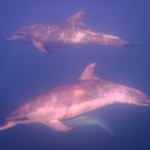
OLYMPUS DIGITAL CAMERA
Another beautiful photo of the dolphins.
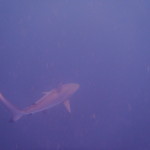
OLYMPUS DIGITAL CAMERA
At one point I looked about twenty feet below me and saw this huge shark. It is a black tip. At the time, our dive master had not told us that the sharks here are not menacing to humans. I began to watch with great care, swimming closer to the boat while not letting myself feel any fear. I took note that there were a lot of us in the water, and the crew did not seem the least bit nervous.
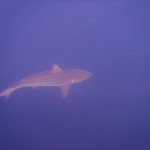
OLYMPUS DIGITAL CAMERA
Another view of the shark.
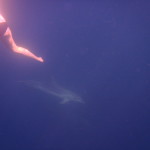
OLYMPUS DIGITAL CAMERA
In this photo of the shark, I giggled when I realized that is “ME” directly above it, LOL.
Actually, as I look closely, that looks like one of the dolphins — but I was swimming that close to the shark too.
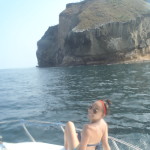
OLYMPUS DIGITAL CAMERA
Back on the boat again as we move closer to Daphne Island. We will be diving on the left side.
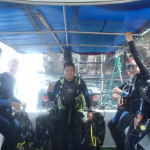
OLYMPUS DIGITAL CAMERA
We dove in two separate groups. That is my dive master in the middle. I am on the right, closest to the camera. You will need to click to enlarge in order to see me because the thumbnail image cut me off.
This is me, all decked out in my gear, ready to jump in. Actually, we sat on the edge of the boat and then fell off backwards, tank first.
The second group was a group of students being taught by another dive master.
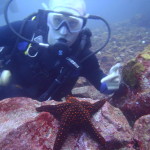
OLYMPUS DIGITAL CAMERA
Me, down at the bottom, posing with a large starfish.
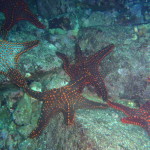
OLYMPUS DIGITAL CAMERA
More similar starfish
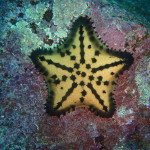
OLYMPUS DIGITAL CAMERA
Another beautiful one.
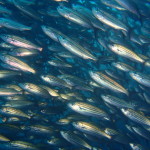
OLYMPUS DIGITAL CAMERA
We spent considerable time playing with a huge school of fish. The dive master told us their name, but I simply do not remember. They were about nine inches in length, silver with black stripes.
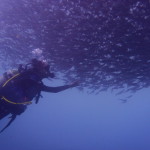
OLYMPUS DIGITAL CAMERA
One of my dive mates, playing around the school of fish.
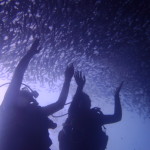
OLYMPUS DIGITAL CAMERA
I think I might be one of these … but I am not sure.
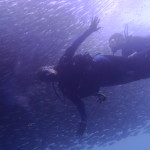
OLYMPUS DIGITAL CAMERA
This is definitely me, floating just below the huge school of dancing fish.
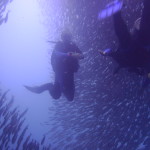
OLYMPUS DIGITAL CAMERA
I think that is me in the upper right, but I am not sure. We are surrounded by a tunnel of fish.
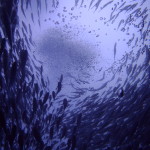
OLYMPUS DIGITAL CAMERA
A view of the tunnel of fish.
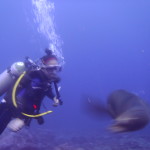
OLYMPUS DIGITAL CAMERA
A few sea lions came out to play. They were a lot more fun to watch down in the water.
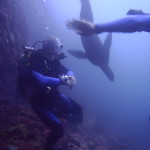
OLYMPUS DIGITAL CAMERA
I cannot remember for sure, but I think this man (bottom left) was my dive buddy. It would have been more fun if that sea lion were my buddy. They didn’t stay around for very long.
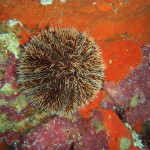
OLYMPUS DIGITAL CAMERA
The dive master took some beautiful photos with his flash.
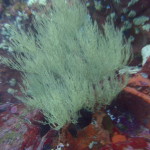
OLYMPUS DIGITAL CAMERA
The flash really brings out the colors.
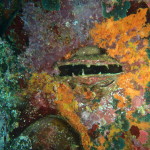
OLYMPUS DIGITAL CAMERA
Looks like a huge clam, with shell partly open.
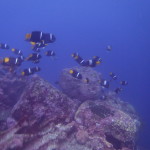
OLYMPUS DIGITAL CAMERA
And an abundance of colorful fish.
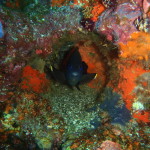
OLYMPUS DIGITAL CAMERA
This little fish says hello.
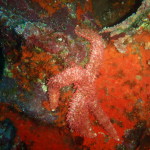
OLYMPUS DIGITAL CAMERA
And a starfish playing around as a contortionist.
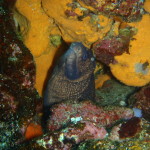
OLYMPUS DIGITAL CAMERA
This Moray Eel was fascinating.
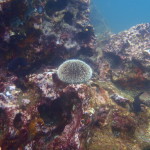
OLYMPUS DIGITAL CAMERA
Lots of fun stuff down here. I believe we went down to around 60 feet during much of the dive.
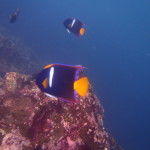
OLYMPUS DIGITAL CAMERA
One more colorful fish before we run out of air and begin to surface.
I was the first to go low on air, and the dive master solved the problem by giving me his emergency hose and then grabbing me … pulling me around while he allowed the others to have more bottom time (including me sharing his air supply).
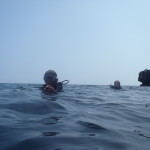
OLYMPUS DIGITAL CAMERA
Finally, we surface (after our three minutes at 15 feet). Yes, that is me in the left center.
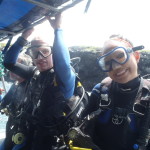
OLYMPUS DIGITAL CAMERA
Back on the boat (after a yummy lunch), preparing for our second dive. In just minutes I will be falling over backwards, splashing down to the depths – this time at “North Seymore”.
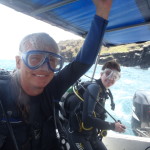
OLYMPUS DIGITAL CAMERA
Another of me preparing to fall backwards, back into the beautiful depths with a new tank of compressed air.
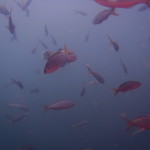
OLYMPUS DIGITAL CAMERA
Beautiful fish.
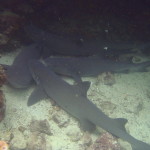
OLYMPUS DIGITAL CAMERA
And a cluster of small Galapagos sharks.
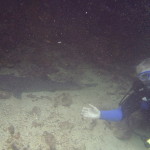
OLYMPUS DIGITAL CAMERA
Yes, that is me, posing with the shark. You will need to click to enlarge the photo if you want to see my face.
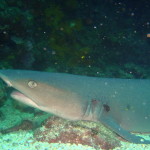
OLYMPUS DIGITAL CAMERA
A closeup of my new friend.
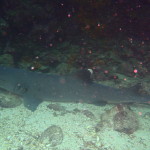
OLYMPUS DIGITAL CAMERA
And another view of the shark.
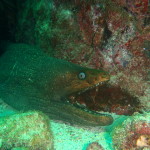
OLYMPUS DIGITAL CAMERA
This Moray Eel was primed in a beautiful pose.
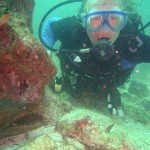
OLYMPUS DIGITAL CAMERA
Me, getting up close (while carefully staying behind the rock) as the dive master takes a photo of me with the eel (bottom left) … click to enlarge for a much better view.
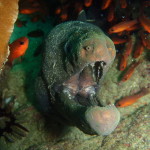
OLYMPUS DIGITAL CAMERA
I am not quite sure what this is, but he definitely says “hi”.
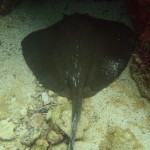
OLYMPUS DIGITAL CAMERA
I only briefly saw one of these “Rays”.
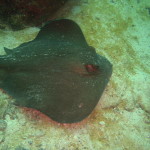
OLYMPUS DIGITAL CAMERA
Another view of the Ray.
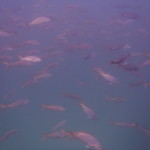
OLYMPUS DIGITAL CAMERA
More fish.
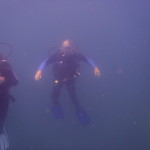
OLYMPUS DIGITAL CAMERA
Me, waiting for three minutes at 15 feet down – near the end of our adventure.
As before, I ran low on air, and rather than ending the dive, the dive master shared with me for a while … until he ended the dive and put me back on my own air for the final ascent.
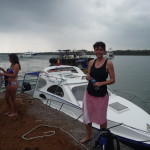
Back on shore, preparing to return to the other side of the island. This is my friend from Canada (who lives in Great Britain).
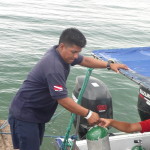
One of the crew, unloading the now-empty air tanks.
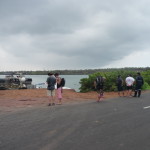
We had to wait for a long time for our taxis to arrive … and there were little bugs biting. I hung out on the road with a large scarf covering my bare legs.
About an hour later, we arrived back in Puerto Ayora.
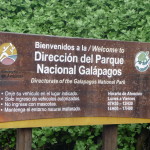
With still an hour of daylight left, I took a walk out to the side of town, following a trail to a part of the National Park that one can visit without a guide.
It was already 5:30 p.m. when I got here, so I just quickly scampered around to check the place out.
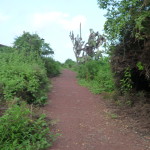
I started walking down this trail, but it was late and I was not sure where I was going, so I turned around. I guess there is a “turtle raising” place down here somewhere.
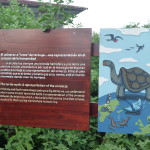
This sign talks about the turtles. I later visit many turtles on three of the islands.
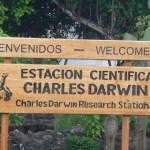
There is also a “Charles Darwin Scientific Station” down here, but I was after hours and everything seemed closed, so I just glanced around outside – briefly.
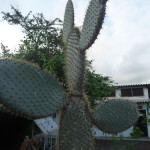
I liked this cactus. I later learn it is an “Opuntia”.
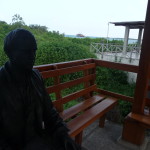
A little waiting area in the Darwin Center. That is a statue there.
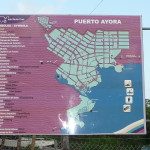
A map of Puerto Ayora. Right now, I am at the “right center” of the map.
Isla Isabela
From May 30 to June 1, 2015, I spent three days and two nights on Isla Isabela, having a very fun time. For convenience purposes, I have decided to save photos from that trip, and will fill up a “Part Two” post with those photos.
Instead, I will continue this post with the rest of my photos from Isla Santa Cruz – photos taken from June 2 – 5, after returning from Isla Isabela.
Santa Cruz Highlands Tour
After returning from Isla Isabela, late in the evening on Monday, June 1, 2015, I quickly made plans to resume exploring Santa Cruz.
On Tuesday, June 2, I took a “Highlands Tour” into the middle, higher-altitude portions of Santa Cruz.
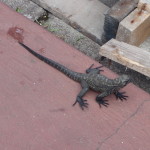
A lizard in Puerto Ayora, as I waited for my afternoon tour to begin.
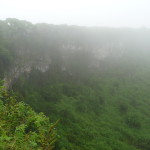
Our first stop on this transport-only tour was at the top of the island, at a place called “Los Gemelos” (The Twins).
These are two huge sinkholes (formed by the collapse of a huge magma chamber), filled with lush vegetation – with one of them on either side of the road. Our taxi driver was not allowed to take us in there, because he is not an official guide.
This photo is looking into one of the huge, gorgeous, sinkholes.
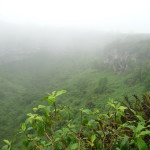
Another view, looking at the other side of the huge crater-like area.
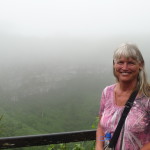
Me, in front of the first “twin” sinkhole.
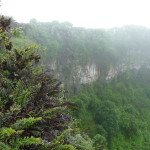
Another view from this spot.
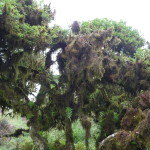
A young Chinese woman was on the tour with me, and the two of us spent about five minutes walking along a trail that went to the right, along the rim of the canyon.
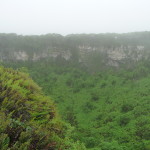
Then we crossed the highway and went to the second of “Los Gemelos”. It looked even bigger.
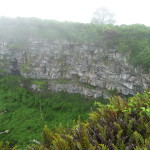
Another view in the second sinkhole.
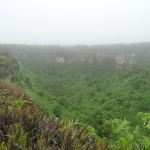
And another.
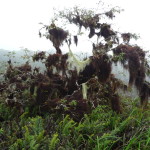
I was fascinated by the moss in the trees. The climate here is so different from that down by the ocean shore.
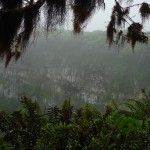
Looking through the moss, down into the sinkhole.
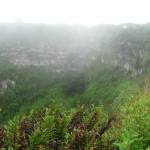
One final view into the sinkhole before returning to our taxi.
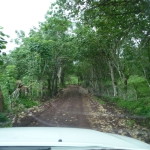
Soon, we found ourselves driving down a dirt road toward a private ranch called “El Chato”. It is situated right on the border of the National Park, and is a place where many land tortoises come to feed and nest.
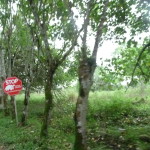
The red sign reads “Stop, turtle crossing”
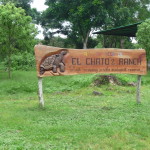
Entering the parking area of “El Chato 2 Ranch” – a private ecological reserve.
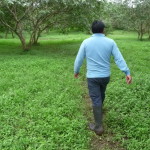
This time, since we are in a private area, the taxi driver is able to play “guide” for us. He quickly gets us some rubber boots and leads us out on the trails in search of wild turtles.
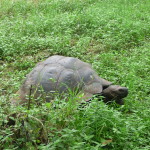
This is the first one we see. There are only a small number here at this time of year. Most of the turtles are further into the park right now, but will return in huge numbers later this fall.
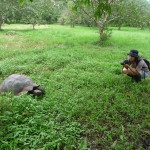
My young Chinese friend, getting a photo.
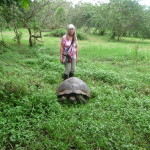
And the guide offers to use my camera to take photos of me.
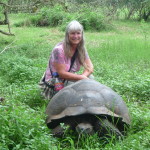
I soon learn that every island in the Galapagos has their own unique variety of land turtles … except for Floreana Island. Their turtles are extinct because of poaching by pirates and early explorers – and that island is importing turtles from other islands.
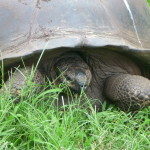
If we make noise, the turtles hiss and pull into their shell. We try to be very quiet and not scare them.
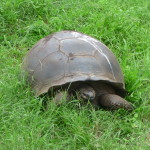
Another view of this one.
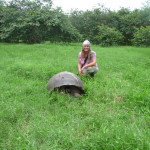
Me with this turtle. We saw six or seven turtles on this hike.
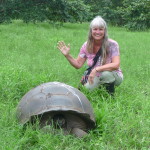
Having fun. We are supposed to stay a coupe of yards away from them, and never touch them.
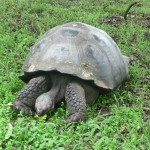
Another one, with his neck extended and fully relaxed. If you click to enlarge, you can see that he is eating something yellow.
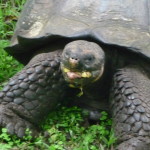
Yum yum … chomping away.
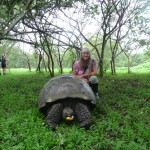
He is enjoying his snack.
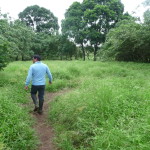
Off in search of another turtle.
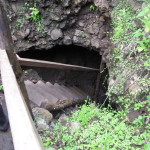
Soon, we leave the turtles behind and take a stroll through a huge lava tunnel. This one is about 100 yards long.
This is the entrance, with a large set of steps leading down inside.
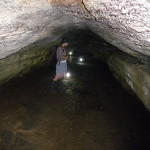
I am glad when I learn that there are lights down here, as I did not bring a flashlight. It is also quite muddy, and I am glad that “El Chato” provides the boots I am wearing.
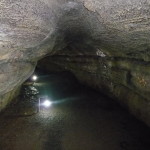
Walking through the long natural lava tunnel.
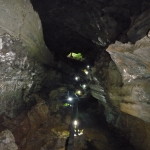
The exit is in sight.
This part of the tunnel is quite large and tall.
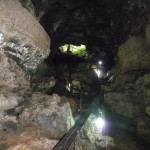
Getting closer to the exit.
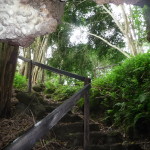
Climbing out the other end.
We soon come to a second lava tunnel, but our guide tells me not to go inside, informing me that there are no lights in this one.
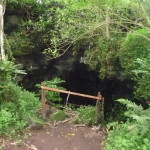
Looking at the entrance to the second tunnel.
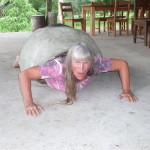
Having fun at the end of the tour … climbing into a real turtle shell.
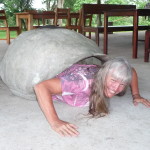
Giggles.
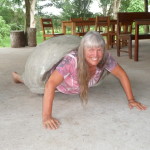
Doing a pushup.
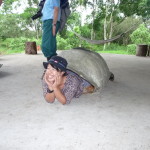
My young friend giggling in the shell.
Bay Tour
Early on June 3, 2015, after a night of intense rain, I hesitatingly (because of previous rain) take a tour out onto the bay in front of Puerto Ayora.
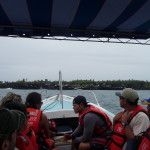
We spend much of the time on a boat.
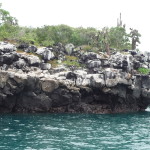
Our first stop is near some beautiful rocks, where we observe “Blue Footed Boobies”, “Marine Iguanas” … and lots of other beautiful scenery.
Luckily, the rains held off and the weather was fairly nice.
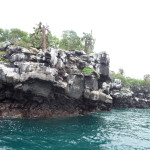
Another view along this gorgeous shoreline.
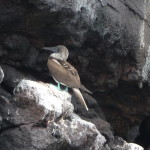
A “Blue-footed Boobie” … click to enlarge if you want to see the color on the feet.
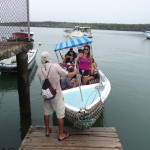
Soon, we pulled up to a boat dock, disembarking and hiking to “Las Grietas” (The Grotto).
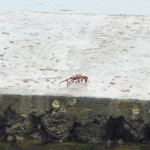
A cute crab that stopped to greet us before running to hide.
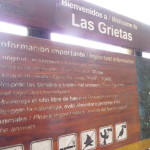
The sign near the entrance.
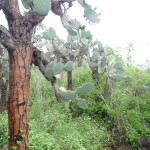
Gorgeous “Opuntia” cactus trees.
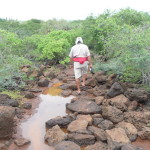
Still walking the very wet trail (night rains) toward the Grotto.
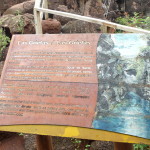
Finally, a sign announces our arrival.
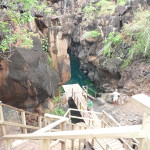
Looking down from the top of the wooden (slippery) steps that descend down to that blue water below.
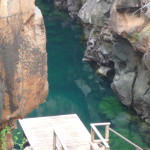
Getting closer. This is a pool of mixed water, fed both by ocean currents and fresh springs.
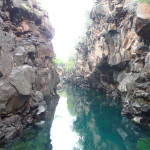
Down near water’s edge. This is a gorgeous site, nestled down in a small slot canyon.
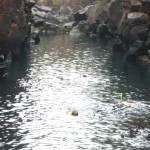
I was the first one in the water. I swam (with snorkel and mask) to the far end, and then back again. After a while, I got out to be the first to dry off, allowing me to take these photos of other snorkeling.
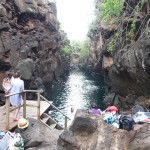
A view from the rock where I left my bag.
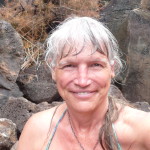
Me, taking a selfie, still in my bikini and very wet.
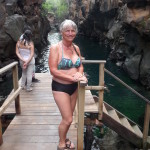
I wasn’t sure if I wanted to post one of me in my bikini, but decided to do so. The tour guide saw me taking a photo of myself and asked for the camera so he could take photos of me.
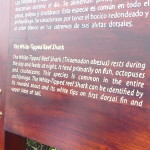
Soon, we hiked back to the boat and crossed the bay where we got off to explore another trail. The first place we went was a place to see sharks in a narrow channel (White Tipped Reef Sharks) … but the water was so churned up by the rains that we could see nothing.
The guide told us we could hike to a nearby beach (in deep mud to get there) … or we could extend our snorkeling time. I didn’t care, but the group choose to snorkel for longer.
Soon, we were back on the boat, jumping into the ocean with no fins, in water that was rough and cloudy.
I snorkeled and enjoyed the swim, but did not see much of anything. I was one of the first back in the boat after a long swim around a point … and a few people saw a sea turtle after I got out. I have seen so many turtles that I opted to not jump back in.
After the snorkeling, the tour ended and we returned to Puerto Ayora.
Tortuga Bay
After the Bay Tour, at just after 4:00 p.m., I decided to use my last hours of sunlight to explore a trail leading through National Park lands, headed to a place called Tortuga Bay. I was delighted by what I found – so delighted that I just knew I would be back to do a ceremony in this area.
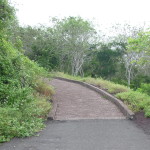
The beginning of the trail, leaving the parking lot (about 15 minutes from town on foot) and leading up to the entrance station.
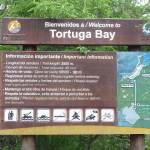
The sign at the start of the trail.
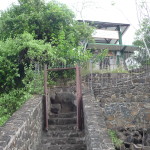
Hiking up a steep trail to the guard station (on top of a small cliff).
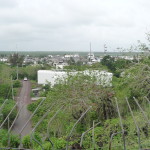
Looking back toward Puerto Ayora from the guard station.
At this station, I had to sign my name in a book, committing to leave the beach to begin returning at 5:00 p.m…..
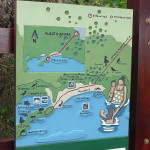
A map of the area. I followed the trail from the top-right of the sign, down to that white beach area down by the ocean.
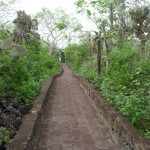
From the first moment I stepped onto this trail, I felt the incredible peaceful energy. Both sides were absolute wilderness, pure, untouched Galapagos National Park.
The trail was quiet except for the occasional person that I encountered.
I loved it here.
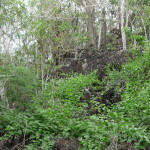
Looking up one side of a hill as seen from the trail.
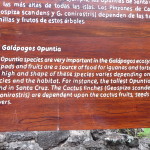
A sign describing the “Galapagos Opuntia” cactus trees, explaining some details about them, and how they are food for iguanas and tortoises, as well as a source of food for the Cactus Finches.
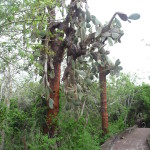
These majestic trees seem to me like tall pine trees with prickly-pear cactus as their leaves.
Quite the interesting combination of natural evolution.
I noticed on a different island that these cactus only seem to be prevalent in the lower elevations, less than a few hundred feet in altitude.
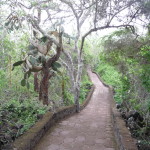
More of the magical trail with an Opuntia Cactus on the left side.
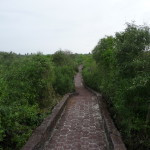
Continuing down the trail. After walking for about forty minutes, I can hear the ocean waves crashing down ahead.
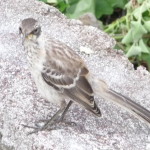
A cute bird stopped to say hello.
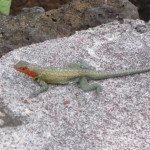
And this little lizard wanted in on the friendly action.
I love their reddish-orange throats.
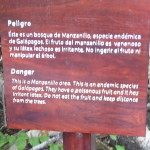
A sign warning about the poisonous “Manzanillo” apples – (and the sap from the tree is also poisonous). The turtles can eat them, but they will kill humans and most animals.
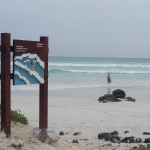
Finally, arriving at this incredible and beautiful beach. It has white sands, very find sand, with turquoise waters. The descent into the water is gradual and you can get quite far out before you are over your head.
The only danger here is that there are said to be strong ocean currents.
Today, I did not come prepared to swim.
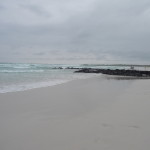
Looking off into the distance on the right side.
Other than that clump of rocks in the foreground, the beach goes on for several hundred yards.
People are not allowed to go onto the higher shore, above the sand area.
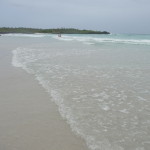
Looking to the left side.
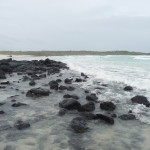
Clear water splashing onto these rocks.
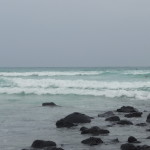
Some surf action in the distance. This is a popular place to surf.
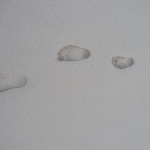
My footprints :)
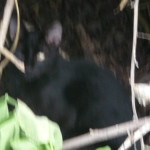
Because it was already late in the day, I only had about fifteen minutes before it was time to leave.
On my way back, I spied this black cat, hiding in the wild beside the trail. I can only imagine that this must be a magical playground for a wild cat.
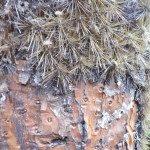
Part of the trunk of an Opuntia cactus tree. It seems that the trunk starts off covered in long needles, and eventually, as it grows, the spines fall off and the trunk looks like a pine tree.
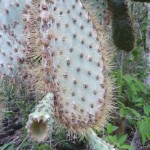
One of the cactus leaves of the Opuntia, with some type of pod growing out of it. I can only presume that it might be the start of a flower blossom.
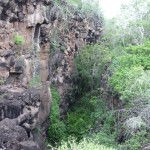
After signing out at the guard station, I took this photo of the cliff just below. There is a fissure here that is more than a hundred feet taller on the left, where the National Park trail begins.
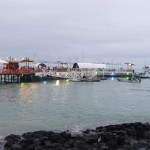
Fifteen minutes later, I am back in Puerto Ayora, loving the view of the main “muelle” or dock with its night lights already turned on. It will be dark soon.
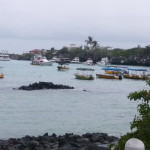
Another view looking out over the bay.
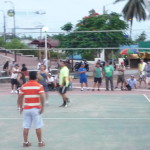
As I head back to my hostal, there is a volleyball game going on. These games seem to take place almost every evening – and the players are all local.
I giggled as I watch them play, because it is obvious that they have been taught to play in a way that is very different than the rules where I come from.
Almost every time they hit the ball it is a flagrant “carry”. They literally catch the ball with their fingertips, and then shove it back into the air.
Since they all do it that way, it seems to me as if they were literally trained to do it this way – an example of how there is no “right” way to to do it.
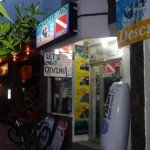
Finally, as darkness sets in, I head back toward my hostal. On the way, I pass by my dive shop – the one I used to go scuba diving earlier in the week.
Isla Floreana Day Trip
On June 4, 2015, I get up early and spend the day traveling to and from the island of Floreana, as part of a day-trip tour group.
The next 32 photos document this trip.
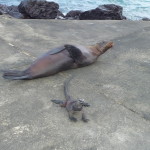
About 20 of us met at 8:00 a.m., where we took a speedboat from Santa Cruz to Floreana, a journey of nearly two hours over rough ocean waters.
As we arrived on the dock at Floreana, we were greeted by sea lions and marine iguanas.
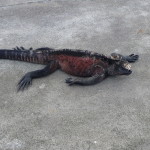
This iguana seemed quite relaxed in the hot sun.
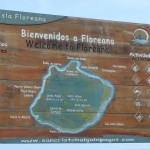
A map of Floreana. Our tour starts halfway up the left side of the island, and heads toward the middle of the island.
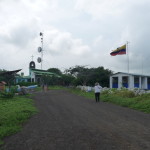
Walking from the dock up toward the restrooms and our bus.
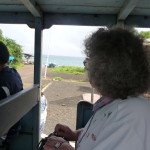
Our “bus” is an old flatbed truck, converted into a transport with the addition of wooden benches and a roof.
The woman in this photo is from Austin Texas. She has a PHD in psychology, and we had some fun conversations.
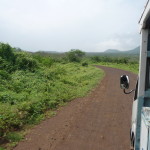
Driving toward the middle of the island.
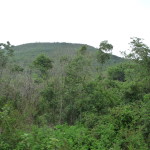
Getting into the higher elevations (less than 3000 feet).
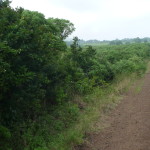
Another view of the typical scenery on this island.
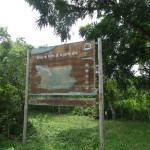
A sign announcing our arrival at the “High Part” of the island that we can visit.
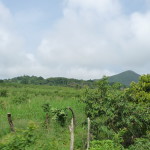
Looking out at more beautiful scenery.
This island is among the older islands in the Galapagos … and one of the first to be settled.
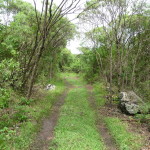
Soon, we were off on a hike to see more turtles. There are no native turtles remaining on Isla Floreana. They were all killed off by early pirates, and other ships. The turtles were used for food on the ships. The turtles can survive for long periods of time without eating … so they were taken aboard and only killed when the ship needed more food.
This happened on other islands too, but the species there were not totally killed off. Here on Floreana, the original turtles are extinct, and they are bringing in turtles from other islands to try to replace them.
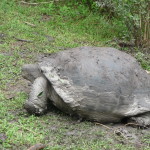
The first turtle we see. He is covered in mud. Our guide says the turtles cover themselves in the mud to help keep the mosquitoes off.
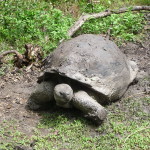
Another view of the same turtle.
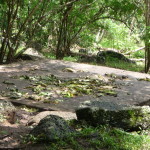
A concrete slab where the turtles are fed. I’m not sure I believe it, but our guide says that no one is allowed to walk up there because the mud on their shoes can carry bacteria that will kill the turtles.
It seems odd to me that if my shoes are muddy from the same mud in which the turtles crawl around, that that mud shouldn’t carry any bacteria that would hurt them …
I ended up having to translate for the English speakers on the tour, because our guide did not speak much English at all.
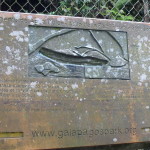
The tour here is more historical than any other that I took. This is a sign that marks the entrance to a spring – the only fresh-water source on the island. It consists of water dripping in a cave-like area, and it drips very slow.
The island of Floreana only has about 140 residents because of the lack of fresh water sources. Our guide told us that each family on the island only gets about 20 minutes of water every couple of days.
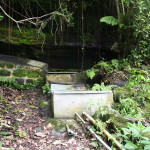
This is the spring itself. The water barely drips back there, and is collected into the small reservoir below, then draining into those pipes.
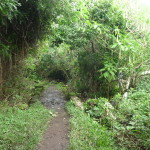
Continuing our hike through the beautiful area.
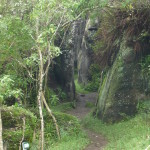
We soon walk through this small canyon area. Our guide makes me translate long stories about the original two German families that settled here … telling us all about the conflict that they had with each other. This place we are exploring is where these families lived.
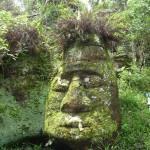
This face was not carved by ancient indigenous people. Apparently, one of the families carved it to teach their children about culture.
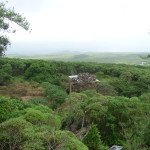
Looking down toward the ocean far below.
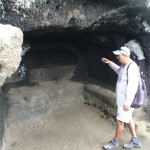
An old cave that is said to be the earliest “hotel” on the island. It is also said to have been a pirate cave.
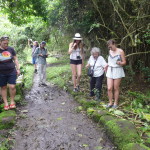
Hiking on the muddy trail back toward our bus.
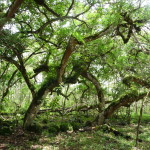
It is quite beautiful here.
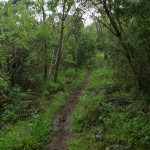
Another trail on our path.
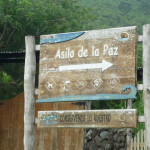
I am not sure what “Asilo” is … the rest of the sign reads “… of the peace”
We ate a yummy lunch here.
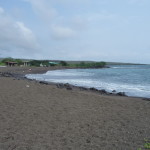
… and then walked a few hundred yards down to the “Black Rock Beach” … where many of us snorkeled.
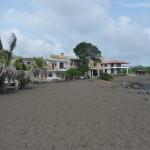
There are even a few small hotels here.
The sand is black, and is very coarse … hurting my feet when I walked on it.
I snorkeled for about forty minutes. I first went to the area where our guide told us was best. It was cloudy and there was absolutely nothing to see. Following a hunch, I swam a hundred yards to the other side of the bay and found an area with a rocky bottom, where I could see several sea turtles. I have a lot of fun snorkeling above and around them.
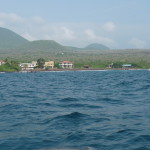
Looking from our boat, back toward Black Rock Beach as we begin to return to Isla Santa Cruz.
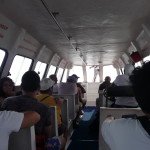
Inside of our boat. I really did not like this boat … it was a real sweat house. The windows in back did not open, and they closed the front because of splashes … very hot ride. Sitting in the back was the least bumpy on the large ocean swells.
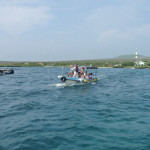
Almost all of my boat rides in the Galapagos involved water taxis. The larger boats were not allowed to pull up to the main docks. Instead, we traveled to and from the boat on water taxis like this one.
I was on the first water taxi bringing passengers to our boat. This is the second taxi arriving with the rest of our tour group.
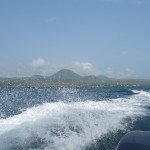
Leaving Isla Floreana in our wake.
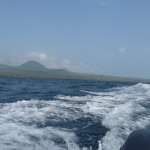
Another view looking back at Floreana.
Tortuga Bay Ceremony
On June 5, 2015, I took a day off from tours and decided to follow my inner guidance telling me to do a medicine ceremony here in the Galapagos. I spent the first several hours of the ceremony doing deep meditation in my room … but as the weather warmed up, I spent the remainder of my time exploring the trail to and from Tortuga Bay – the same place I had scouted out a few days earlier.
I found myself being especially connected to the magical nature all around me.
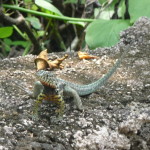
Many lizards came to hang out nearby. They were especially beautiful today.
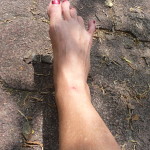
At one point, as I sat on the trail’s short wall, I moved my legs and felt something sting me. A wasp had been resting on my right ankle and I had pushed it with my left ankle, causing it to sting me. For a few moments, the wasp curled up on the ground below, but then disappeared when I was not watching.
The sting hurt, and was bloody-red right at the point where the skin was broken, and got puffy for a half inch around … but was mostly insignificant.
Rather than feel victimized, I giggled and saw it as an unknown part of my process today.
You can see the red dot on the front of my ankle.
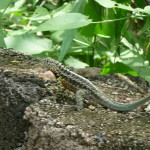
Another cute lizard sharing energy with me.
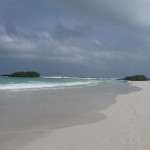
Eventually, I walked down to the beautiful beach, and continued exploring further down in the distance to the right.
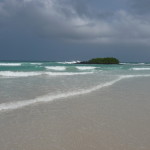
I absolutely love this beach.
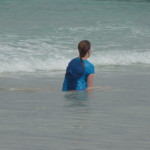
At the far end of the beach, I observed this woman seeming to sit and meditate in the surf. She was there for a very long time. I could really identify with what she was doing. When she left, I took her spot for a while.
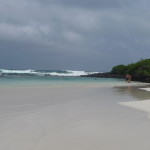
It was a spot right in front of this point, where the water was calm, and currents flowed from two sides.
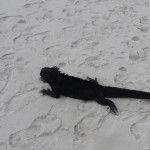
There are lots of black marine iguanas down here.
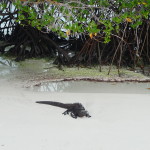
And another one. This area is surrounded by mangroves too.
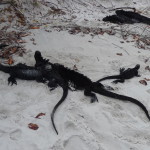
An “Iguana Pile” … I suppose it is similar to dog pile.
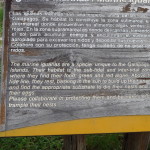
A sign talking about the marine iguanas. Click to enlarge if you are interested in reading more.
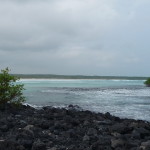
Looking out at the area where the woman was meditating in the water. This is where I went a little while later … out there in the calm area.
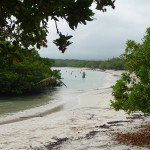
Just around the bend was another large bay, a much calmer one, surrounded by mangroves. This is an area where some people snorkel and kayak.
I started to swim here, but the water was to murky for me – colored a little from the mangrove roots.
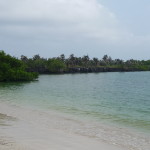
Another view of this mangrove-surrounded bay.
After swimming for a while in the “other” spot where the woman had been meditating, I began a slow walk back toward town.
Along the way I stopped and sang songs. I was alive with joy. I giggled frequently as four or five little finches would fly in to be my audience. They literally seemed to gravitate to my singing.
I was tired and finally arrived back at my hotel to finish my ceremony.
A Children’s Parade
A while later, I heard what sounded like a parade outside. Feeling quite curious I put on my flip flops, grabbed my camera and purse, and went out for a look. It was indeed a parade, just a block away.
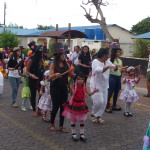
The first thing I saw was this group of children, with strings tied to their body, with the adults behind them pretending to guide them as if they were marionettes.
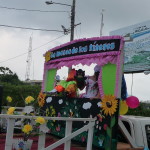
Soon, noticing how slowly the parade was moving, I hurried a block forward to see the very front. This is the back of the second entry in the parade. I am not sure what those words say on this homemade float.
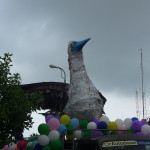
I loved this float at the front – made in honor of the “Blue Footed Boobie” bird.
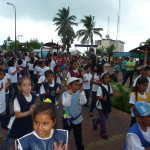
Children following the Blue Footed Boobie.
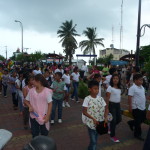
More of the children.
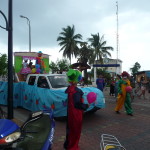
The front of the second entry in the parade.
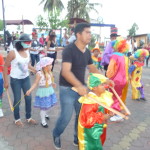
And now back to the puppets, which were the third entry in the parade.
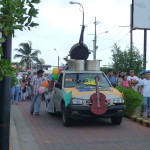
And the forth entry had a music theme.
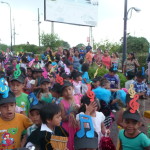
Followed by children sporting a musical note theme.
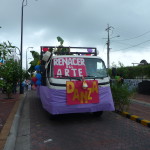
The fifth and final entry … “The Rebirth of Art”
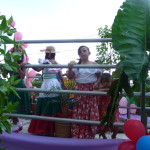
Young girls on the back of the float.
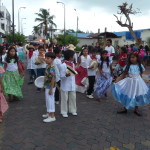
… and children dancing behind the float.
Summary
This concludes Part One of what will likely be three posts on my time in the Galapagos. I am going to try to finish another one later today – one covering my three days in the Isabela Island.
Copyright © 2015 by Brenda Larsen, All Rights Reserved
